News
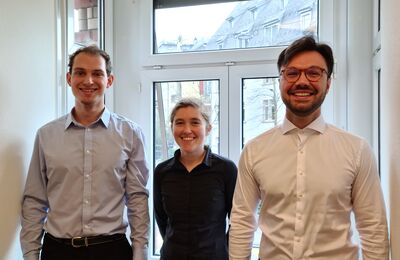
We are delighted to welcome Nina Schnyder and Stephan Minger to the team and congratulate Andreas Stritt on his promotion.
Andreas Stritt has been with Swiss Economics since 2022 and has been promoted to Economist. He focuses on energy, transport and competition economics. He earned a Master's degree in economics from the University of Berne, with a focus on data analysis and industrial economics.
Nina Schnyder also joins the team as an Economist. She holds a Master's degree in Environmental Economics from the London School of Economics. After graduating, she worked as an energy and environmental consultant in London and Berlin and will continue to specialize in these areas at Swiss Economics.
Stephan Minger joins Swiss Economics as an Analyst. He holds a Master's degree in Economics from the University of St. Gallen with a focus on financial economics and data analysis. During his studies, he worked as a reasearch assistant in the areas of financial market econometrics, derivatives and monetary policy.
We are confident that their skills and experience will be a valuable addition to our team.

We warmly welcome Winand Emons to our team as a consultant!
We are pleased to welcome Prof. emer. Dr. Winand Emons as a counsel to the Swiss Economics team. He strengthens our team especially in the area of competition economics. Winand Emons has not only distinguished himself in research and teaching at the University of Bern, but has also held important positions as a member of the Competition Commission, Dean and Vice-Dean of the Faculty of Business, Economics and Social Sciences and a member of the Research Commission of the Swiss National Science Foundation (SNSF). His work in his main research focus in the areas of law and economics, microeconomics and competition economics led to numerous publications in renowned journals.
We warmly welcome Winand Emons and wish him success and pleasure in his new activities for Swiss Economics.
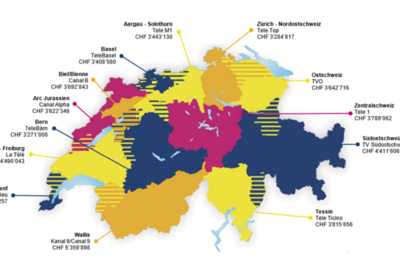
Swiss Economics has supported the AZ Regionalfernsehen AG and CH Media in their applications for broadcasting licenses for the years 2025 to 2034.
AZ Regionalfernsehen AG successfully applied with Tele M1 and TeleBärn for the broadcasting licenses in the Aargau/Solothurn and Bern regions. An expert opinion from Swiss Economics was submitted as part of the application. Swiss Economics prepared a second report for CH Media too, that led to a similar success. CH Media has acquired with Radio Central the local radio broadcasting license for the Central-Switzerland region.
Our reports examined in particular the influence of the award of the license on the diversity of offerings and opinions. The focus was on the conflict of objectives between the strict structural independence of broadcasters and their possibility of offering a diverse program. The positive externality of media content for democratic decision-making, which justifies state support for public service, only exists if viewers are truly interested in the broadcasted content. Very small, but structurally independent media providers are usually unable to build up the necessary reach with their limited financial resources, e.g. due to the lack of economies of scale. In addition, there are strong incentives to provide a diverse program, particularly in concentrated media markets.
Swiss Economics concludes in its reports that the synergy benefits and the strengthening of regional media in journalistic competition outweigh any concerns regarding structural independence.
Click here for the project entry on our website.

We welcome Maida Sabotic and Elena Zarkovic to our team and congratulate Seline Spillman and Leah Meyer de Stadelhofen on their promotions.
Seline Spillmann joins our team as Economist. Her focus is on data analysis in various topics as well as labor economics. Among other things, she is active in the fields of competition economics and health. In her master she studied economics at the University of Zurich with a focus on econometrics. During her studies, she worked as a Research Assistant in the area of globalization and labor markets at the University of Zurich.
Elena Zarković joins us as an analyst. She studied economics and business administration in her bachelor's at the University of St. Gallen, where she also earned an additional certificate in Data Science Fundamentals. During her studies, she worked as a research assistant at the Swiss Institute for International Economics and Applied Economic Research at the University of St. Gallen.
Maida Sabotic joins the Swiss Economics team as an Economist. Her areas of expertise include economic policy and data analysis. She holds a Bachelor's degree in Economics, Politics and History from the University of Zurich as well as Master's degree in Economics and Data Science. During her studies she worked at the Institute of Economics at the University of Zurich. After her Master's degree, she completed an internship in economic development cooperation at the State Secretariat for Economic Affairs.
Leah Meyer de Stadelhofen joins our team as an Economist, focusing on behavioral economics, industrial economics and data analysis. Her areas of expertise include regulation, environmental economics, and energy. In addition, Leah joins our Romandie department and is thus involved in the development of Swiss Economics in French-speaking Switzerland and France. She holds a Master in Economics from the University of Lausanne with a specialization in Behavior, Economics, and Evolution. During her studies, she worked as a Teaching Assistant in Microeconomics.
We congratulate all of them and wish them much success and joy in their new activities for Swiss Economics.
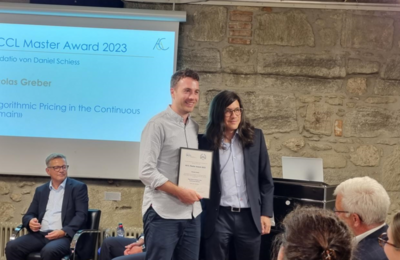
We warmly congratulate our staff member, Nicolals Greber, on receiving the ACCL Award for his Master's thesis! The award ceremony took place on 19 September at the Atelier de la Concurrence in Bern.
In his Master's thesis, Nicolas Greber examined the behaviour of self-learning pricing algorithms. Recent studies have shown that certain AI pricing algorithms are able to learn tacit collusion in oligopoly models. Nicolas picked up there with his master's thesis, analysing the behaviour of two more recent AI pricing algorithms. The first algorithm, known as the "deep deterministic policy gradient", failed to achieve constant convergence. In contrast, the second algorithm, the "multi-agent deep deterministic policy gradient", achieved consistent results in a Nash equilibrium. These findings were confirmed by various robustness tests.
We wish Nicolas all the best and success in his PhD at the University of Zürich and in his work for Swiss Economics.

Last weekend we celebrated our 15th anniversary with a visit to the power station, dinner and an overnight stay at the Grimsel Hospiz!
Last weekend we spent an unforgettable time together at the Grimsel Hospiz, surrounded by the breathtaking scenery of the Grimsel region.
Highlights included exciting excursions to the hydroelectric power plant and the impressive Aare Gorge, and a delicious 5-course meal. These experiences deepen our appreciation for 15 years of successful projects.
As passionate economists, we are proud of our continuous growth. This journey would not have been possible without our dedicated team and inspiring projects.
Here's to the next exciting chapters full of success and exciting projects!
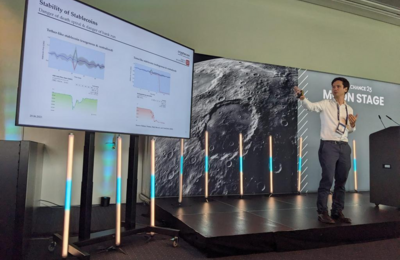
In a recent presentation at the Blockchance conference in Hamburg, Matthias Hafner explored the factors that influence the stability of stablecoins and discussed how they relate to recent developments in CBDCs and the tokenization of real-world assets.
Drawing from recent literature, including his own research conducted at the University of Zurich, Matthias Hafner emphasized that the construction and management of collateral are key determinants of stablecoin stability. While externally derived collateral value may compromise the independence of the stablecoin ecosystem, collateral value derived from within the ecosystem carries the risk of death spirals, as observed with TerraUSD. Additionally, centralized management may offer cost-effectiveness but exposes the stablecoin ecosystem to the risk of bank runs, as exemplified by the recent USDC depeg incident.
Further, Matthias Hafner argued that the advent of CBDCs and tokenized real-world assets could potentially put pressure on the demand for stablecoins in the future. This could, for example, result in the need to introduce solutions for stablecoins that offer interest payments based on their underlying collateral.
More detailed information can be found here:
Blockchance presentation slides
Matthias Hafner's research on stablecoins
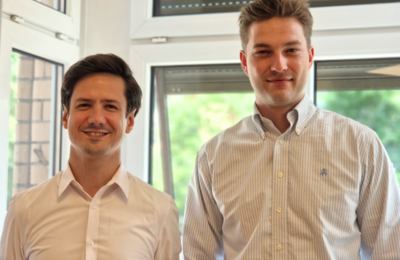
We are happy to announce that Matthias Hafner has been promoted to Principal. Nicolas Oderbolz has been supporting our team as an Economist since the beginning of this year.
Matthias Hafner supports our team with immediate effect as a Principal and remains the Director of the Center for Cryptoeconomics.
His areas of expertise include financial services, blockchains and cryptoassets.
With his expertise and many years of experience, he will continue to make an indispensable contribution to the further development of these areas. Matthias regularly advises large companies and public authorities and supports start-ups in the implementation of their projects. In addition, he is writing his dissertation and teaches at the University of Zurich on various crypto topics. Before joining Swiss Economics in 2016, he worked at the Competition Commission.
Nicolas Oderbolz has joined Swiss Economics as an Economist with a focus on regulation, health and blockchain. He is involved in various projects in the fields of energy, data analytics and cryptoassets.
Nicolas completed his Bachelor and Master studies in Economics at the University of Zurich, with a focus on empirical methods and data analysis. During his studies, he worked as a research assistant at the University of Zurich in the field of labour and development economics. He has been a valuable part of the Swiss Economics team since the summer of 2022.
We congratulate both of them and wish them much success and joy in their new activities for Swiss Economics.

The article "Blockchain und ihre Anwendungen" by Matthias Hafner and Dr. Christian Jaag was recently published in the quarterly issue of the zsis) Centre for Swiss and International Tax Law.
In their contribution, they explain how blockchain works through illustrative examples and use cases. In addition, they explain the legal classification of crypto-assets and show the limits of the technology.
The publication can be accessed here.
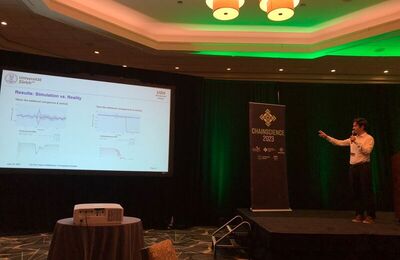
Matthias Hafner presented his research on stablecoins at the Wolfram ChainScience conference in Boston, USA.
The article, "The Four Types of Stablecoins: A Comparative Analysis" (jointly with Marco Henriques Pereira, Prof. Dr. Helmut Dietl, and Juan Beccuti) discusses the conditions under which stablecoins may lose their value. Among others, they explore the crash of Terra and the de- and re-peg of the USDC stablecoin.
Link to the slides: The Four Types of Stablecoins (swiss-economics.ch)

In less than a week, the Shanghai-update is going to be realized on the Ethereum Beacon Chain. This long-anticipated event in the blockchain community motivated us to discuss and compare staking designs of different blockchains in a series of blog post.
In our second blog post of this series, we analyze and compare the staking designs of different blockchains from an economic perspective. To make the information more accessible and compact, we also created a table which can serve as a quick reference.
You can find the whole publication and our new Company Profile on Medium.
Don't hesitate to follow us there to stay updated on our upcoming publications!
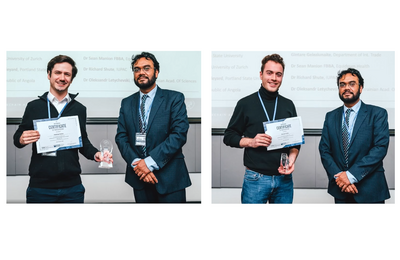
Matthias Hafner and Nicolas Greber were awarded first and third place at BBA's 5th Scientific Conference for their research presentations.
Matthias Hafner and Nicolas Greber, two of our blockchain researchers, have made their mark at BBA's 5th Scientific Conference, with first and third place awards for their research presentations.
Matthias explained the recent depeg of the second largest stablecoin USDC and under what conditions stablecoins could lose their value. The paper and slides were created in collaboration with Marco Henriques Pereira, Juan Beccuti and Helmut Dietl.
Nicolas proposed mechanisms for handling liquidity risk using the DeFi lending platform Folks Finance. The paper and slides are the result of joint work with Matthias Hafner, Romain de Luze, Juan Becutti, Benedetto Biondi, Gidon Katten, Michelangelo Riccobene, and Alberto Arrigoni.
More about the British Blockchain Association.
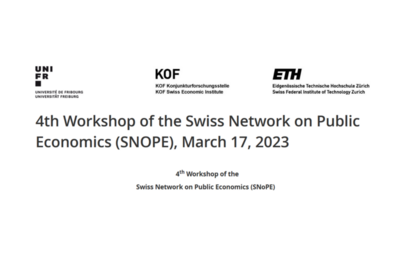
Swiss Economics presents the study "Effectiveness of Corona Measures in Switzerland "
Effectiveness of Corona Measures in Switzerland
Michael Funk presented our study “Effectiveness of Corona Measures in Switzerland” at the 4th Workshop of the Swiss Network on Public Economics (SNoPE). The network aims to strengthen the ties between academics, public administration, the Swiss National Bank and private institutions such as Swiss Economics. This is exactly the intersection we address in almost all of our projects. The study provides important insights into the effectiveness of individual Corona measures in Switzerland. In addition, as the discussion at SNoPE also showed, important lessons can be learned about the opportunities and challenges of empirical evaluation for the public sector. In particular, meeting academic standards and solving non-trivial identification problems while facing time and budget constraints.

In light of the Shanghai update of the Ethereum blockchain, which allows stakers to unstake their ETH, we find it timely to investigate crypto staking in a series of upcoming blog posts.
In our first blog post, we explain the basic terms, economics and mechanisms of staking designs. Later, we compare the staking designs of seven different blockchains.
You can find the whole publication and our new Company Profile on Medium.
Don't hesitate to follow us there to stay updated on our upcoming publications!
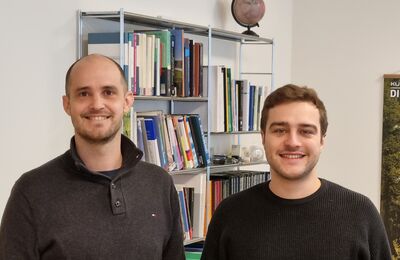
Ramon Gmür joins the team as Economist, Romain de Luze promoted to Senior Economist.
Ramon Gmür strengthens our team as an Economist focusing on economic policy, regulatory economics and data analysis. Ramon studied economics, politics and history in his Bachelor's degree at the University of Zurich. He holds a Master’s degree in Economics and Data Science from the University of Zürich, with a special focus on Econometrics and Statistics. During his studies, he worked several years for two chairs at the University of Zurich. Prior to his studies, he worked for a major Swiss bank and earned the business title “Wirtschaftsfachmann KSZH.
Romain de Luze has been promoted to Senior Economist with a focus on regulation, data analytics and risk management. His areas of expertise include energy, financial services and cryptoassets. Additionally, Romain is involved in the development of Swiss Economics in French-speaking Switzerland and France. He holds a Master’s degree in Actuarial Science from the University of Lausanne and a Master’s degree in Economics from the University of Berne. Before Swiss Economics, he worked for several years as a quantitative analyst for a reinsurance company in Zurich.
We congratulate both of them and wish them much success and fun in their new activities for Swiss Economics.

Christian Jaag and Samuel Rutz were awarded "Leading Practitioners" by WWL in the category of Competition Economics.
Every year, Who's Who Legal identifies the world's leading competition economists. This year, Swiss Economics is represented twice - by Christian Jaag and Samuel Rutz - in the illustrious circle of "Leading Practitioners" in Europe (EMEA). We would like to thank our clients for the great trust they place in us.
WWL on Christian Jaag and Samuel Rutz:
Christian Jaag of Swiss Economics receives a lot of recognition for his economic expertise. And is described as an expert who "ensures razor-sharp analyses and can explain highly complex issues simply".
Samuel Rutz is described by peers as an outstanding competition economist in Switzerland who brings his experience as former Chief Economist of the Swiss Competition Commission to bear on the concerns of his clients.
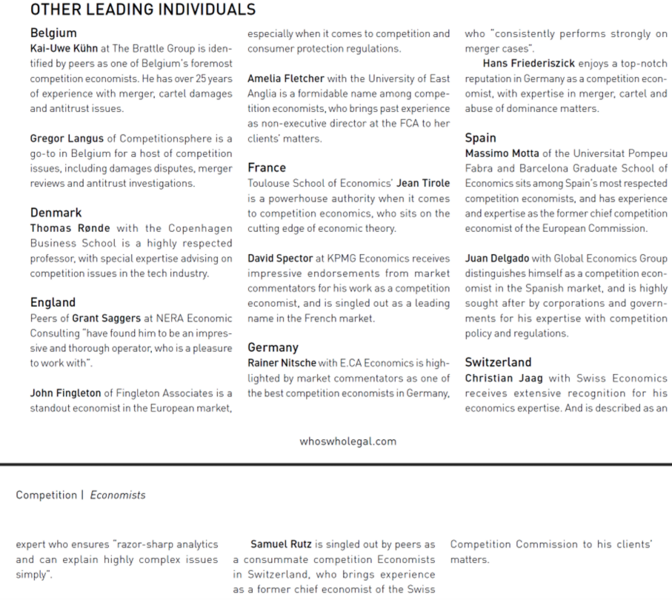

What possibilities are there for using Blockchain Technology to make processes in the creation of value with IP more secure, transparent and efficient? A study for the Swiss Federal Institute of Intellectual Property (IPI).
Intellectual property, for example in the form of patents or copyrights, protects inventors from free riders and thus creates incentives to invest more in research and development and in creative works. IP is also relevant to the rapidly developing field of Blockchain Technology and applications. IPI would like to better assess the current and, more importantly, future demand for IP-services.
As part of this study, we are conducting a survey to which we would like to cordially invite you. The outcome of this survey will be key in shaping the IPI's services related to blockchain and IP. You can participate in the survey until October 31, 2022 over the following link: www.swiss-economics.ch/ip-survey.html.
If you are active in the field of Blockchain and/or IP, we would be delighted to incorporate your opinions, experience and expertise in this study.

We have a new Logo!
Swiss Economics has a new logo. It was designed by Diego Bally and symbolizes our abbreviation "SE". The majority of its components are pointing upwards. The logo represents our development so far and our vision for the next years. Since September, it has decorated our office windows.
The new logo will be rolled out gradually over the next weeks and months. First, we will adapt our web presence, then we will implement it in our documents.
We hope you like it!

Beatrix Marosvölgyi joined our team as an Economist. Her focus lies in environmental and political economics.
Beatrix’s expertise lies in environmental economics, regulatory impact assessments and digital markets. She completed her bachelor's degree in economics at the University of Lucerne and her master's degree at the University of Bern with a focus on environmental economics. Her master's thesis focused on the change in air pollutants due to the aircraft grounding in U.S. airspace after the 9/11 terrorist attacks.
During her studies, Beatrix worked for Swiss Post, the Universities of Lucerne and Bern, and Ernst & Young. She joined Swiss Economics in 2022 as an Analyst.
She is proficient in German and English with mother tongue Hungarian.
We wish Beatrix all the best for her future at Swiss Economics.

The Center for Cryptoeconomics partners with proof-of-stake Blockchain Algorand
Swiss Economics' Center for Cryptoeconomics (cryptecon) joins the Partner Program to intensify its services in the Algorand ecosystem. Algorand is a pure proof-of-stake blockchain focused on the convergence between decentralized and traditional finance. A perfect match for cryptecon with its strong expertise in tokenomics and protocol design for DeFi projects. Previously, cryptecon already advised several Algorand projects such as Folks Finance and Pact. We are now looking forward to intensifying our efforts on Algorand and providing our services as a Preferred Partner.
Algorand creates a green Blockchain with strong focus on efficiency and is exclusive Blockchain Partner of FIFA’s Men’s World Cup 2022 and official Sponsor of FIFA’s Women’s World Cup 2023.

More about Algorand.

We are pleased to announce that Nicolas Greber has joined the team as an Economist. His focus is on competition economics and data-driven analysis including artificial intelligence.
Nicolas Greber holds a bachelor's degree in economics with a focus on industrial economics from the University of Bern. He is currently completing his Master's degree in Economics at the University of St. Gallen with a thesis on the impact of artificial intelligence on competition.

How to design a Swiss Innovation Fund?
The Federal Council wants to strengthen Switzerland as a location for start-ups. On June 22, 2022, it made a decision in favour of a Swiss Innovation Fund. This is intended to improve the financing ecosystem of start-ups during the growth phase (to the press release).
In this context, Swiss Economics was commissioned by SECO to conduct a study on the fundamentals of such an Innovation Fund. The focus was on identifying international best practices and evaluating possible governance options for a Swiss Innovation Fund (Swiss Economics report).
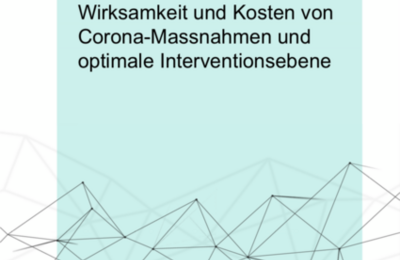
On behalf of the State Secretariat for Economic Affairs (SECO), Swiss Economics has updated its findings on the effectiveness of non-pharmaceutical measures to combat the pandemic.
Swiss Economics has examined the effectiveness of non-pharmaceutical interventions ("NPI") to contain the coronavirus (to the Swiss Economics study) for a second time. This is an update of the meta-analysis on this topic commissioned by the State Secretariat for Economic Affairs (SECO) in June 2020. In addition to the question of the effectiveness of NPI, the study also evaluates the literature on the costs of particular measures and discusses the findings on factors such as the weather and the acceptance of NPI among the population. In the course of combating the pandemic, the question of the optimal level of intervention also arose in Switzerland. Another part of the study is devoted to this question.
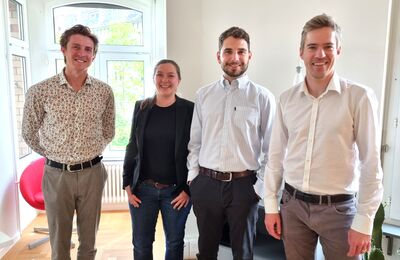
Felix Wüthrich and Luca Apreda now Economist, Eva Zuberbühler und Nicolas Eschenbaum now Senior Economist
We are expanding our team:
Felix Wüthrich strengthens our team as an Economist in the areas of environmental economics, behavioural economics and data analysis. During his studies at ETH Zurich, Felix already completed an internship at Swiss Economics and subsequently supported our team as an Analyst.
Luca Apreda, now also Economist, has a focus on regulation and quantitative methods. After completing his Master's degree at the University of Bern, Luca joined Swiss Economics as an Analyst.
Dr. Eva Zuberbühler has been promoted to Senior Economist. Her expertise lies in the areas of regulation, competition, strategy and pricing. Prior to completing her PhD in industrial economics at the University of Bern, Eva worked as a corporate client advisor at a major bank
Dr. Nicolas Eschenbaum has also been promoted to Senior Economist. He focuses on competition economics and digital markets. Nicolas received his PhD in industrial economics from the University of St. Gallen and conducted postdoctoral research on the competitive impact of artificial intelligence, among other topics.
We congratulate all four and wish them much success and joy in their further work for Swiss Economics.

Michael Funk was asked about the consquences of the EU Digital Markets Act (DMA) and Digital Services Act (DSA) by SRF's daily podcast "Newsplus".
The EU is working to improve the current regulatory framework for digital products. The introduction of the Digital Markets Act (DMA) and the Digital Services Act (DSA) is intended to create a uniform set of rules valid throughout the EU.
Michael Funk was asked by SRF about the consequences of the extensive package for Switzerland.
To the podcast (in German): https://www.srf.ch/audio/news-plus/eine-neue-aera-fuer-internet-giganten?id=12166241

We are pleased to welcome Dr. Nicolas Eschenbaum as a new team member of Swiss Economics. He will strengthen our competences in competition economics and regulation.
Nicolas Eschenbaum is an experienced economist focusing on competition economics and economics of digitization.
He holds a Ph.D. in Economics and Finance from the University of St. Gallen with a thesis in industrial organization with a focus on digital markets. Prior to joining Swiss Economics, Nicolas worked as a postdoctoral researcher at the University of St. Gallen, where he continues to conduct research and teach. Currently, his research focuses on the intersection of game theory and artificial intelligence.

We are pleased to announce that Matteo Mattmann has been appointed Managing Economist as of January 1.
We welcome Matteo Mattmann among the shareholders of Swiss Economics. As a member of the Management Board, he will develop our activities in health and behavioural economics. We wish him every success in his new position and look forward to thee continuing collaboration.

Since January 2021, Swiss Economics is a carbon neutral company. Swiss Economics minimizes greenhouse gas emissions and offsets emissions that cannot be avoided.
The exact principles with which we try to contribute to the achievement of Switzerland's climate goals can be found here.
For the year 2021, our employees have decided to offset by means of a reforestation project in Nicaragua. The offset is certified by myclimate.

The modernisation of Swiss merger control is the core element of the partial revision of the Cartel Act (KG). With its 2017 study about the SIEC test, Swiss Economics made an important contribution to the revision.
The partial revision of the KG envisages adapting the Swiss test for merger control to international practice. The fundamental difference between the market dominance test applied in Switzerland so far and the newly envisaged SIEC test lies in the level of the intervention hurdle. Under the SIEC test, mergers can be prohibited or subject to appropriate conditions if they lead to a "significant" impediment to competition. In contrast, under the current standard of review, this is only possible if a merger "completely" eliminates effective competition. In addition, the planned revision also aims to strengthen private damages actions and provides for several procedural changes as well as a clarification with regard to inadmissible agreements.
The consultation period lasts until 11 March 2022. It can be assumed that the new provisions will not enter into force before 2023/24.
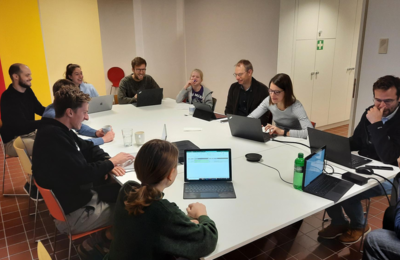
Malou and Valpuri had the opportunity to spend the "Future Day" at Swiss Economics.
Highlights of their day in our office were conducting interviews and editing them into a video, behavioural economics experiments with a chocolate reward and eating pizza in the park. The thoughts of the two primary school students of their fathers' work are in the video below.
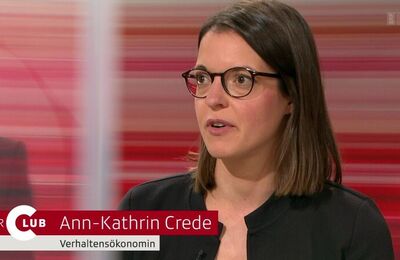
Ann-Kathrin Crede participated in the SRF programme "Club" on the topic of National Immunisation Week and contributed with her behavioural economics expertise to the question of how to incentivize people to vaccinate themselves.
Quelle: srf.ch
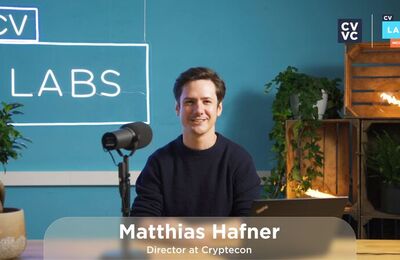
Swiss Economics/cryptecon continue to support the CV Labs Incubation Program for start-ups using the Blockchain technology.
Recently, Juan Beccuti joined CV Labs as a mentor for the start-ups' incubation program. Together with Matthias Hafner (who joined CV Labs in 2019), he shares his expertise in platform and token economics. They present and discuss with the program's participants the main characteristics, considerations, and decisions to consider when designing token-based ecosystems.
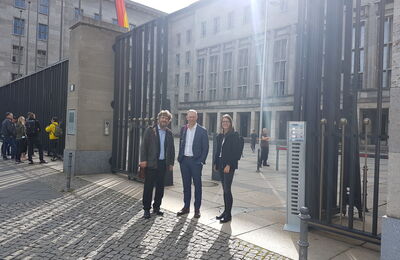
Presentation of the interim report in the project to hedge terror and pandemic risks at the Federal Ministry of Finance in Berlin.
Swiss Economics, presented together with Christian Hott (from Economic Advice) the first results in the project on hedging terror and pandemic risks at the Federal Ministry of Finance in Berlin.
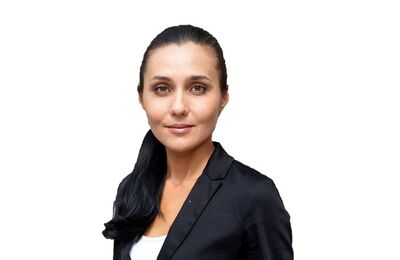
Lilia is a quantitative economist strengthening our competencies in analyzing panel and time-series data. Lilia is proficient in English and German with mother tongue Russian.
Dr. Lilia Ruslanova is a quantiative economist focusing on empirical methods, econometrics and DCF modelling. She holds a PhD in Economics from the University of Zurich. During her work as a doctoral student as well as research associate at the University of Zurich, she accumulated years of proficient experience in processing and analyzing data using various quantitative methods and statistical tools. The main fields of her research interests are International Macroeconomics, International Trade, Financial Regulation, Financial and Real Estate Markets.

Juan is a microeconomist and industrial engineer with a focus on market design. He will support Swiss Economics in platform and crypto economics.
Juan is an experienced economist focusing on platform economics, contract theory, and auctions. Amongst others, he will support our team in the analysis of incentives in crypto markets and blockchain protocols. Juan's mother tongue is Spanish, extending our reach into the Hispanic region.
Juan holds a Ph.D. in Economics from Universidad Carlos III de Madrid with a dissertation about mechanism design. He also has a degree in industrial engineering. Prior to joining Swiss Economics full-time, Juan supported Swiss Economics as a Senior Fellow and worked as a Postdoctoral Associate at the University of Bern.

We have moved!
Right next to the tram station Ottikerstrasse we have found freshly renovated and bright office premises with more space.
Our new address:
Swiss Economics
Ottikerstrasse 7
CH-8006 Zurich

We welcome our new team member Dr. Eva Zuberbühler. Eva has a strong background in industrial economics an will strengthen our competences in regulation and competition economics.
Eva Zuberbühler is Economist with a focus on regulation, competition economics, valuation as well as strategy and pricing. Before she received a PhD from the University of Bern she worked for several years in the corporate client's division at a bank.

Our website is now also available in French.
To better serve our French-speaking customers our website is now available in French.
For the time being, some parts of the website such as News and Projects remain in English and/or German.
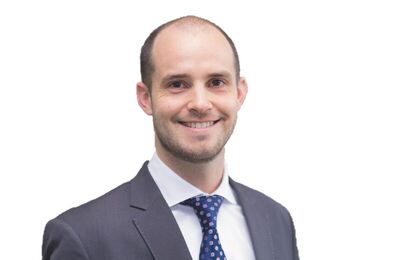
We welcome our new team member Romain de Luze, focusing on Data Analysis and Financial Services.
Romain de Luze is an Economist with a focus on data analytics, financial services and the energy sector. He studied at HEC Lausanne as well as at the University of Bern. He worked for several years as a quantitative risk analyst at a leading reinsurance company in Zurich.
He holds a Bachelor's degree in Management and a Master's degree in Actuarial Sciences from HEC Lausanne and will soon complete a second Master's degree in Economics at the University of Bern.

Who's Who Legal Switzerland recognized Christian Jaag as Competition Economist of the Year for the third time in a row.
The Who’s Who Legal Awards are awarded each year to leading Swiss firms, specialist lawyers and experts in recognition of their outstanding performance and contribution to their respective industries.
Further information can be found here.

The German Economic Institute awarded Ann-Kathrin Crede for her outstanding PhD thesis in behavioral economics.
Ann-Kathrin Crede is awarded the Max-Weber-Preis. The German Economic Institute awarded her for her PhD thesis "Experimental evidence on behaviour in organizations and markets". The Institute honours young researchers for their contributions to business ethics and ethics of economics. Congratulations, Ann-Kathrin Crede!

Lukas Bruhin ist Fürspecher und verfügt über langjährige Erfahrung in der Regulierung von Netzindustrien sowie in der Steuerung und Führung zentraler und dezentraler Einheiten des Bundes.
Er ist Präsident des Institutsrats von Swissmedic und war zuletzt acht Jahre Generalsekretär des Eidgenössischen Departements des Innern (EDI). Zuvor arbeitete er unter anderem im Eidgenössischen Departement für Umwelt, Verkehr, Energie und Kommunikation (UVEK) als stellvertretender Generalsekretär sowie bei der Schweizerischen Post als Leiter Internationales und Regulierungsfragen und als persönlicher Mitarbeiter des Konzernleiters.
Der Verwaltungsrat von Swiss Economics entscheidet über die strategische und organisatorische Ausrichtung von Swiss Economics.

Swiss Competition Commission (COMCO) cleared the transaction Sunrise | Liberty Global. Swiss Economics accompanied the examination from the outset with economic expertise.
Swiss Economics unterstütze Sunrise in diesem Verfahren in enger Zusammenarbeit mit der Anwaltskanzlei Lenz & Staehelin. Unser Team umfasste Samuel Rutz, Michael Funk, Matthias Hafner und Christian Jaag.
Swiss Economics hatte Sunrise bereits im letztjährigen Fusionskontrollverfahren bezüglich der umgekehrten Transaktion erfolgreich unterstützt. Schon damals hatte die WEKO den Zusammenschluss nach vertiefter Prüfung bedingungslos freigegeben. Anschliessend lehnte jedoch die Mehrheit der Aktionäre/innen die Übernahme ab. Nach erneuter Prüfung kam die WEKO zum Schluss, dass die Marktverhältnisse seither weitgehend unverändert blieben.

Who’s Who Legal 2020 featured Samuel Rutz, Michael Funk and Christian Jaag for their outstanding work in competition economics.
Samuel Rutz is mentioned in the following categories:
- - Competition - Economists
- - Experts - Economics - Competition Economists
WWL says: Samuel Rutz is a well-recognised figure in the Swiss market who is commended for his profound knowledge of competition regulation and policy.
Michael Funk is mentioned in the following categories:
- - Competition Future Leaders - Economists
- - Experts - Economics - Competition Economists - Future Leaders
WWL says: Michael Funk receives widespread commendations for his excellent practice, which sees him provide commercially astute analysis on competition policy issues.
Christian Jaag is mentioned in the following categories:
- - Competition - Economists
- - Experts - Economics - Competition Economists
- - Switzerland - Competition Economists
WWL says: Christian Jaag is "highly recommended" as "one of the very best competition economists in Switzerland". Peers and clients say: "Christian is brilliant at connecting academic and abstract thinking to concrete business needs."

Swiss Economics Principal Tobias Binz discusses this question in an article published in the latest issue of Competition and Regulation in Network Industries.
He uses a microeconomic framework to illustrate how firm and market characteristics determine the extent to which economy-wide demand shocks are translated into profit fluctuations. The findings may help regulators to improve the composition of the peer groups that are used to assess airports' Beta risk.
The published article can be accessed online through Competition and Regulation in Network Industries' website. A working paper version is available here.

The Fair Price Initiative aims to introduce the concept of "relative market power" to Swiss competition law. However, from an economic point of view, the concept is not an appropriate instrument to combat the high prices in Switzerland.
Read more (German)

Swiss Economics was commissioned by the Swiss State Secretariat for Economic Affairs (SECO) to conduct a meta-analysis on the effectiveness of non-pharmaceutical measures to contain the spread of the coronavirus.
On the 27th of April, two months after they were first introduced, the federal government started to relax the measures to contain the spread of the new coronavirus (SARS-CoV-2). It cannot be ruled out that this easing will lead to a renewed increase in infection rates or even a second wave of infections.
The Swiss Economics study provides an overview of available evidence on the effectiveness of various measures and indicates which measures would be particularly appropriate to implement in case infection rates start to increase again.

Swiss Economics supported the Irish Commission for Aviation Regulation in determining capital costs over the 2020-24 regulatory period. The Appeals Panel has decided in favour of the Commission of Aviation Regulation regarding appeals about capital costs.
Swiss Economics supported the Irish Commission for Aviation Regulation (CAR) in determining capital costs (WACC) over the 2020-24 regulatory period. After CAR published its projections, appeals have been made by Dublin Airport and Raynair. Among other points, the appeals targeted capital costs. An independent panel has now rejected most points of these appeals including the capital costs. CAR welcomes the decision of the panel and its argumentation. The panel stated that the numbers rely on the evaluation of the current economic conditions and conform with statutory requirements.
Press Release from the Commission for Aviation Regulation (2 June 2020)

Sunrise claims damages of CHF 350 million from Swisscom for abuse of its dominant position in the ADSL wholesale sector. Swiss Economics has supported Sunrise in quantifying the harm from the infringement.
Extract from the press release:
Swisscom abused its dominant market position from 2001 to 2007, and unlawfully hindered the competition with its pricing policy for ADSL services. The former monopolist practised a margin squeeze which made it impossible for Sunrise as a wholesale customer, to operate its ADSL business profitably.
This was confirmed by the Federal Supreme Court on December 9, 2019 after a ten-year appeal process. Swisscom was sentenced to a fine of CHF 186 million.
On the basis of this ruling, Sunrise is claiming damages of CHF 350 million plus interest from Swisscom.
Sunrise commissioned the renowned consulting company Swiss Economics to calculate the damage to Sunrise. This is due to the loss of market share and prevented gain in the broadband Internet market and adjacent markets (landline and mobile communications). The total amounts to CHF 457 million, a greater number than originally assumed. As a precautionary measure to prevent limitation, Sunrise had interrupted the statute of limitation for a claim of CHF 350 million and is filing a claim for damages of CHF 350 million plus interest with the Bern Commercial Court today.
Our team includes Christian Jaag, Michael Funk and Matthias Hafner.
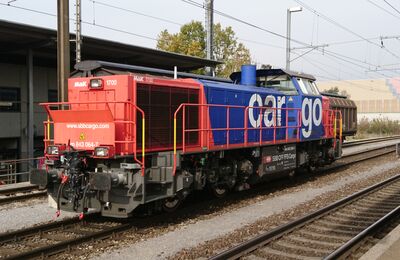
The Swiss Competition Commission has approved a merger between Swiss railway company SBB Cargo and several road freight firms without imposing any remedies. Swiss Economics provided economic evidence related to efficiencies arising from the merger to inform the Commission's thinking.
The Competition Commission found that the investment of Swiss Combi (a joint venture of Planzer, Camion-Transport, Galliker, and Bertschi) in SBB Cargo does not eliminate competition in any of the concerned markets. The decision will increase the economic viability of the Swiss rail freight business and will lead to innovative new services being made available.
During Phase II of the investigation, Swiss Economics, in collaboration with SBB Cargo and law firm Walder Wyss, produced detailed economic evidence of the investment's effects on competition and welfare. The engagement was led by Samuel Rutz, Michael Funk, and Tobias Binz.

We welcome our new team member Dr. Ann-Kathrin Crede, focusing on Behavioral Economics.
Ann-Kathrin Crede works as an economist with a focus on Behavioral Economics. She graduated with her PhD in Behavioral and Experimental Economics at the University of Bern and gained experience in running laboratory and field experiments and in applying behavioural insights to organizations during her time as a research assistant.
She holds a Master’s degree in Economics from the University of Passau and a Bachelor’s degree in Business & Economics and French from the University of Kassel.

The French Autorité de régulation des transports (ART) has published its opinion on the appropriate level of the Weighted Average Cost of Capital (WACC) for Parisian airports Charles de Gaulle, Orly, and Le Bourget.
The opinion will play a central role in the negotiations between Aéroports de Paris Group and the French government regarding the Economic Regulation Agreement over the 2021-25 period.
For the assessment of Beta risk, the regulator relied on evidence provided by Swiss Economics. Our contribution was twofold. First, we analysed what drives airports’ systematic risk and defined risk categories for airports under ART’s mandate. Second, we identified valid comparator airports and determined the level of their Beta risk, using regression analysis of stock returns. Our reports on drivers of Beta risk and comparator Betas can be downloaded directly from ART’s website:
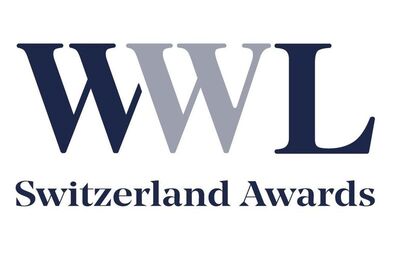
Team members of Swiss Economics awarded by Who is Who Switzerland 2020.
Christian Jaag and Samuel Rutz are highlighted for their excellent work as Competition Economists:
“At Swiss Economics, Christian Jaag has an exemplary ability ‘to convey and explain highly complex matters’ to peers and clients alike. His knowledge and skillset make him a ‘brilliant economist to work with’ and one of the leading names in Switzerland.”
“Samuel Rutz of Swiss Economics has wide-ranging knowledge and extensive experience of competition regulation and policy matters in Switzerland.”
#whoswholegal #wwl #competition

Who's Who Legal and Client Choice honoured Christian Jaag as the best Competition Economist in Switzerland in 2020.
At the inaugural Who's Who Legal Switzerland Awards ceremony on February 12, 2020, in Zurich Christian Jaag received the Competition Economist of the Year 2020 Award. Each year Who's Who Legal presents awards to individuals that have performed exceptionally well in each of the featured practice areas according to Who's Who Legal's research.
To the WWL Switzerland award winners
In addition, Christian Jaag was recently rewarded with the Lexology Client Choice award also for his work as a Competition Economist.
Established in 2005, Client Choice recognises those individuals around the world that stand apart for the excellent client care they provide and the quality of their service. The criteria for this recognition focus on the ability to add real value to clients’ businesses above and beyond the other players in the market.

The World Economic Forum (WEF) attracted not only politicians, managers and scientists to Davos but also Blockchain experts, start-ups and investors. Swiss Economics was delighted to exchange views with them.
During the World Economic Forum (WEF), the incubation space provider of the largest Swiss Blockchain Venture Capitalist, CV Labs, organized several events in Davos designed to showcase and discuss the Blockchain ecosystem. Since Christian Jaag, Matthias Hafner and Jan Christoph Schlegel are mentoring start-ups from the CV Labs incubation program, we were happy to see them pitch and progress, and to exchange views about current topics in the Blockchain ecosystem. Discussions included successful projects Swiss Economics supported in the past. CV VC proudly stated that there are now over 800 Blockchain companies in Switzerland and Lichtenstein. Swiss Economics is looking forward to new exciting collaborations in the Blockchain industry.

Swiss Economics Principal Michael Funk presents his views on the importance of economic analyses in antitrust proceedings during the “Swiss Network on Public Economics”-Workshop at ETH Zurich
At the first workshop of the "Swiss Network on Public Economics" Michael Funk presented a paper on the importance of economic analyses in antitrust proceedings. The focus was on the most recent development in Switzerland, which has resulted in the marginalisation of the economy. This development contrasts with the development in the European Union, where the negative effects of a violation of antitrust law are generally the focus of the proceedings.
The aim of the newly founded network is to strengthen relations between academics and practitioners at universities, in public administrations, the Swiss National Bank and private institutions.

Congratulations to Swiss Economics Counsel Christian Jaag for being recognized as a thought leader in the topic of competition by Who's Who Legal.
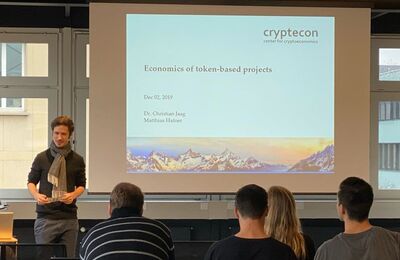
Swiss Economics supports the second incubation program of the largest investment ecosystem for start-ups using the Blockchain technology in Zug, Switzerland (CV Labs Incubation Program).
Recently, Christian Jaag and Matthias Hafner met the start-ups and presented their expertise and experience in platform and monetary economics for token-based projects. In their workshop they discussed characteristics, considerations and decisions to be made when designing token-based ecosystems.

In a collaboration with Professors Pierre Fleckinger and Constance Monnier, both affiliated with OCA, our competition law disputes partner in France, Tobias Binz and Christian Jaag authored an article on the sensitivity underlying theoretical predictions of the pass-on rate. The article has been published in Concurrences N°4-2019.
The article can be accessed online through the Concurrences website.
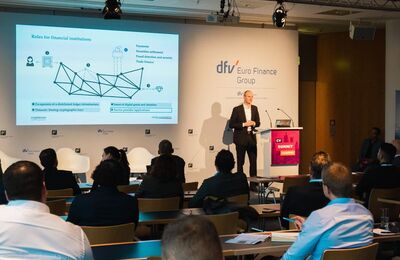
Christian Jaag gave the opening keynote at the CV summit Frankfurt which is part of this year’s Euro Finance Week.
Christian Jaag shared his thoughts on “Be your own bank? The role of financial institutions in a decentralized economy”.

The Irish Commission for Aviation Regulation has published its Final Determination on the maximum level of passenger levies that Dublin Airport may charge over the 2020-24 regulatory period.
The new price cap regime ensures that passengers travelling through Dublin Airport will experience high-quality services at a reasonable cost. Swiss Economics advised the Commission on the appropriate allowance for capital costs. In our work, we considered recent developments in financial markets, Dublin Airport’s ambitious investment plans, differences in risk profiles across airports, and many other factors that play a role in determining the regulatory WACC. The Commission has published our report alongside its Final Determination on its website.
To the Swiss Economics report
To the Final Determination of the Commission for Aviation Regulation
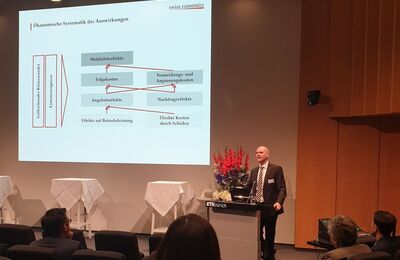
At the "Infrastrukturtagung 2019" Christian Jaag presented a literature overview on the effects of climate change on Swiss infrastructures.
Abstract of the report:
"Wie wird sich der Klimawandel auf die Schweizer Infrastruktursektoren auswirken? Im Rahmen eines Literaturüberblicks werden Studien aus dem In- und Ausland ab dem Jahr 2007 ausgewertet. Die zusätzlichen Schäden entstehen durch den schleichenden Klimawandel und Extremereignisse. Neben dem Transport- und dem Energiesektor sind auch die Wasserversorgung, Industrieinfrastrukturen, soziale Infrastrukturen und der Tourismus betroffen. Obwohl der Klimawandel insgesamt mehr Schaden als Nutzen bringt, hat er auch positive Auswirkungen. Zum Beispiel kommt es zu weniger kältebedingten Schäden an Strassen und Schienen und die Ausgaben für Heizenergie sinken. Mit steigenden Temperaturen nimmt auch die relative Attraktivität der Schweiz als Sommer-Tourismusdestination zu. Sämtliche verfügbaren Quantifizierungen der Auswirkungen des Klimawandels sind allerdings noch mit grossen Unsicherheiten behaftet."

Christian Jaag becomes an Advisor to the Centre for Evidence Based Blockchain (CEBB) and Swiss Economics' Centre for Cryptoeconomics joins the CEEB as an institutional member.
CEBB is a neutral, independent and decentralised consortium of leading Blockchain research institutions.
Led by some of the world's most eminent academics, CEBB will devise scientific benchmarks and frameworks to support governments, businesses and policymakers in making evidence-based decisions. As a collective voice on the advancement of Evidence-Based blockchain, the academic "Think Tank" of thought leaders and researchers endeavours to establish internationally agreed standards on education, research and policy-making for blockchain technologies. CEBB will also support organisations in setting up regional and institutional EBB chapters, run by the CEBB Leads. CEBB will also assist with the advancement of high-quality research, call for papers and dissemination of scholarly content within the CEBB network. It will also facilitate joint initiatives, workshops, journal clubs, and other academic activities with CEBB members.
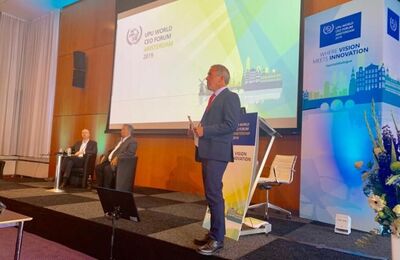
Christian Jaag spoke at the UPU World CEO Forum about Blockchain in the postal sector.
As digitalization takes hold and affects whole swathes of national economies, businesses need to adapt and innovate more rapidly than ever. In this context, blockchain and cryptographic technologies can be part of the answer. Yet, there are several possible elements to innovation in this area. An increasingly popular idea is to have start-ups develop the innovations that postal operators will later apply to their business processes. Christian Jaag had an Interesting discussion with Moses Ma, Derek Osborn and the world's postal CEOs about how they have considered and/or applied blockchain innovations in the international postal sector, including through partnerships with start-ups.

Following an in-depth merger examination, the Swiss Competition Commission (COMCO) cleared the transaction Sunrise | Liberty Global on 23 September 2019 without any remedies. Swiss Economics closely accompanied the examination from the outset with economic expertise.
According to COMCO, the transaction will not lead to the creation or strengthening of a dominant position in any of the markets analysed. Rather, COMCO expects the takeover to stimulate competition. Further details can be found in the COMCO press release.
Swiss Economics collaborated during the whole merger examination closely with Meyerlustenberger Lachenal Ltd. (MLL), who advised and represented Sunrise in this merger control proceeding from the outset. Swiss Economics was – inter alia – responsible for data handling, contributed to the economic analysis in all phases of the merger control proceeding and drafted several reports. Our team included Samuel Rutz, Michael Funk, Matthias Hafner and Tobias Binz. On the part of MLL, the team was led by Mario Strebel and included Fabian Koch, André Berne and Göktug Gürbüz. The close collaboration between Swiss Economics and MLL ensured optimal case management both from a legal and economic perspective.
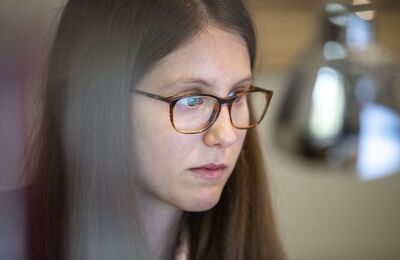
The redistribution from the rich to the poor is very important, as a new study by the University of Lucerne, in which Melanie Häner was involved, shows. A summary of the study was published in today's Neue Zürcher Zeitung.
In addition to a redistributive effect between generations, the OASI also has a redistributive effect from rich to poor. OASI contributions above a certain income have the character of a "high-wage tax" and the minimum pension acts as a basic income for pensioners. The NZZ article by Christoph Schaltegger, Christian Frey and Melanie Häner quantifies the extent of this redistribution.

Publication of a proposal for an amended Swiss electricity market design. Guarantees of origin play a crucial role.
Author: Urs Trinkner
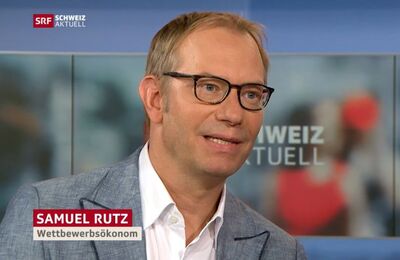
Samuel Rutz speaks about health tourism in "Schweiz Aktuell", a daily news broadcast of the Swiss Broadcasting Corporation (
The video clip can be accessed through the SRG's website.

Who’s Who Legal 2019 featured Samuel Rutz, Michael Funk and Christian Jaag for their outstanding work in competition economics.
Samuel Rutz is mentioned in the following categories:
- - Competition - Economists
- - Experts - Economics - Competition Economists
WWL says: Samuel Rutz is a well-recognised figure in the Swiss market who is commended for his profound knowledge of competition regulation and policy.
Michael Funk is mentioned in the following categories:
- - Competition Future Leaders - Economists
- - Experts - Economics - Competition Economists - Future Leaders
WWL says: Michael Funk is recognised by peers as an "experienced competition economist" who is able to draw on his "great background" at the Swiss investigation authority.
Christian Jaag is mentioned in the following categories:
- - Competition - Economists
- - Experts - Economics - Competition Economists
- - Switzerland - Competition Economists
WWL says: At Swiss Economics, Christian Jaag is lauded as “one of the very best economists active today” who is “able to convey and explain highly complex matters to a broad range of audiences”. He possesses “in-depth knowledge of the area” and is known for his “great ability to challenge traditional concepts”.

We concluded the celebrations for our 10th anniversary with a trip to the Monte Rosa Hut.
We concluded the celebrations for our 10-year-anniversary with a trip to the Monte Rosa Hut in the Swiss Alps close to Zermatt. Guided by Peter Schoch we enjoyed the beautiful nature between Matterhorn and Monte Rosa.
 |
 |
|
|
Start towards Monte Rosa |
|
"Edelweiss" on the wayside |
 |
 |
|
|
Entrance of the Gorner Glacier |
|
Monte Rosa Hut during dinner |
 |
 |
|
| On the panoramic tour back to Zermatt |
|
Crevasse in the upper part of the Gorner Glacier |

Swiss Economics' center for cryptoeconomics is awarded with the Fintech Award "Best Economic Research & Consulting Services 2019 - Europe" hosted by Wealth & Finance International.
To the Award
More on the Center for Cryptoeconomics (cryptecon)

Swiss Economics is happy to announce the new collaboration with CV VC, a Swiss venture capital company for start-ups using Blockchain technology.
Swiss Economics' collaborates with CV VC, the largest investment ecosystem for start-ups using Blockchain technology in Zug, Switzerland. Swiss Economic's platform for blockchain and cryptocurrencies (cryptecon) mentors the participants of the CV Labs Incubation Program. The first edition of the program is now ongoing. Out of 500 applications from 35 countries, 12 startups were selected to participate in the program.
Christian Jaag and Matthias Hafner met the start-ups and presented their expertise and experience in platform and monetary economics for token-based projects. They presented the most important characteristics, considerations and decisions to be made when designing token-based ecosystems.

Urs Trinkner presented his views on how to improve the institutional design of the Swiss rail market at the Lucerne symposium "20 years of railways reform".
To the presentation
To the program
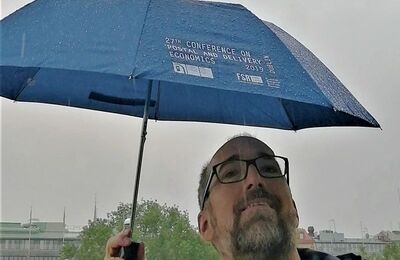
Michael Funk gave two speeches at the 27th Conference for Postal and Delivery Economics in rainy Dublin.
Michael Funk presented his interpretation of the seminal Post Denmark II decision as well as a paper by his colleagues Andreas Haller, Christian Jaag, and Urs Trinkner on the funding of the USO and net cost balancing. As always, this yearly conference of academics and practitioners provided a tremendous opportunity for learning and connecting.

Publication of Samuel Rutz and Urs Trinkner on the economics of water and whether Swiss water utilities should be privatised or not.
Wasser ist aus ökonomischer Sicht kein öffentliches Gut. Gleichwohl kann die leitungsgebundene Wasserversorgung nicht unbesehen den Marktkräften überlassen werden, da insbesondere beim Verteilnetz ein «monopolistischer Engpass» besteht. Die Ausgangslage präsentiert sich ähnlich wie bei Strom-, Gas- und Schienennetzen: Entweder erbringt die öffentliche Hand die gewünschte Versorgung selbst, oder sie übergibt diese an öffentliche oder private Leistungserbringer. Im zweiten Fall gewährleistet er die Qualität der Wasserversorgung durch Regulierung. Aus ökonomischer Sicht sind beide Wege gangbar. Für Schweizer Gemeinden, die über eine gute direktdemokratische Kontrolle verfügen, kann die öffentliche Eigenerbringung vorteilhaft sein.
Autoren: Samuel Rutz, Urs Trinkner

The Irish Commission for Aviation Regulation has published its draft decision on the maximum level of Airport Charges at Dublin Airport over the 2020-24 regulatory period. For the allowed rate of return on capital, the authority has relied on a report prepared by Swiss Economics.
Our report reflects that financial markets are currently undergoing exceptional times. Real government bond yields have fallen to a historically low level in the past couple of years, suggesting that the real expected return from risk-free assets is currently negative. Traditional approaches to estimating the cost of capital may fail to adequately capture the peculiarities of this new market environment. Hence, we assessed whether the ECB’s recent halt of quantitative easing is likely to have a significant effect on the market and analysed whether financial markets expect bond yields to rise again in the near future. Also, we considered evidence that expectations on equity returns may be more stable over time than underlying risk premia, indicating a so-called Total Market Return approach may be preferred over the traditional Equity Risk Premium approach to estimate the cost of equity.
The full report can be downloaded from the Commission for Aviation Regulation’s website.

Does digitalization require new rules for the international taxation of companies? OECD and the European Union try to change international tax law in favour of countries where consumption takes place.
In der aktuellen Ausgabe der Zeitschrift für Europarecht hat Christian Jaag zusammen mit Luzius Cavelti einen Leitartikel zum Thema «Die Bedeutung der Digitalisierung für das internationale Unternehmenssteuerrecht» publiziert.

At the inaugural Who's Who Legal Switzerland Awards ceremony on April 3, 2019, in Zurich, Christian Jaag received the Competition Economists Switzerland Expert of the Year 2019 Award. Each year Who's Who Legal presents awards to individuals that have performed exceptionally well in each of the featured practice areas according to Who's Who Legal's research.
Who's Who Legal finds that "at Swiss Economics, Christian Jaag is definitely a brilliant economist to work with according to sources. They note he is the strongest competition economist in Switzerland and enjoys a very good reputation for his work in the field."
To the article.
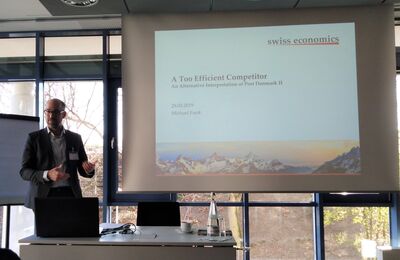
Michael Funk recently gave his interpretation of the influential Post Denmark II decision to an audience at the Annual Conference of the Leibniz ScienceCampus 2019 Mannheim Centre for Competition and Innovation (MaCCI).
At the Annual Conference of Mannheim Centre for Competition and Innovation, Michael Funk presented a Swiss Economics research paper on competition economics. He argues that a notional as-efficient competitor, often used in the economic assessment of abuse of dominance cases, can be too efficient to be of relevance in practice. In particular, joint costs, which are required to comply with a Universal Service Obligation, should not be considered sunk when determining the cost structure for other services or else there is a risk of imposing unrealistic efficiency standards on competitors.

Bundesnetzagentur published the latest benchmarking report by Swiss Economics. In the report, methodical details are carried out and the results are documented.
Swiss Economics, together with SUMICSID and IAEW carried out an efficiency comparison of electricity distribution system operators in the third regulatory period. Analyzed in detail was, among others, the illustration of decentralized generation. The published draft contains all important methodical aspects and documents the results. For the benchmarking, around 200 system operators were compared based on their cost efficiency. The final version will follow after the system operators have had the opportunity to comment on the draft.

Swiss Economics and COMCO present a case at the Annual conference of the Association of Competition Economists (ACE)
Screening tools can mitigate the dependency on whistleblowers and leniency applicants and enable the authorities to fight against bid rigging cartels proactively. The Investigation "See Gaster" in Switzerland was triggered by an ex-ante screening method developed by the Swiss Competition Commission. In the session, Yavuz Karagök (ComCo), Frode Steen (Norwegian School of Economics) and Michael Funk (Swiss Economics) discuss the strengths and weaknesses of screening methods with a concrete example.

Swiss Economics analyses the impact of the sharing economy on public transport.
Swiss Economics has investigated the impact of the sharing economy on public transport together with the University of Lucerne. Based on our discrete choice experiments we conclude that regulations are critical for the expected modal split.

Samuel Rutz's article «Screening for «Bid Rigging Does it Work?» was recently published in the Journal of Competition Law & Economics.
The article discusses a screening method to detect bid rigging cartels. Based on the findings of the authors, the Swiss Competition Commission (COMCO) opened an investigation and sanctioned several firms for bid rigging.

Christian Jaag was named «leading expert» in the categories Legal Competition and Consulting Experts. Samuel Rutz was honoured as a «future leader» in the categories of Competition and Consulting Experts.
Dr. Christian Jaag and Dr. Samuel Rutz have recently been featured in Who's Who Legal 2018.
Christian is listed in Who's Who Legal: Competition as a leading economist. WWL says: «Christian Jaag is a superb competition economist who is regularly called on to advise both public and private-sector clients on strategy, regulation and policy.»In addition, he is listed in Who's Who Legal: Switzerland. WWL writes: «Christian Jaag is widely recognised as «a leading competition economist» and impresses peers with his «highly creative, precise and hands-on approach», as well as his «impressive theoretical and practical skills». Lastly, Christian is listed in Who's Who: Consulting Experts.
To Christian's biography on WWL
Samuel is listed as a future leader in Who's Who Legal: Competition and Who's Who Legal: Consulting Experts.

The article «The more economic approach to predatory pricing» was recently published in the Journal of Competition Law & Economics.
Abstract: The «more economic approach» was introduced to antitrust to achieve a more effect-based and theoretically grounded enforcement. However, related to predatory pricing it resulted in systematic over- and under-enforcement: Economic theory does not require dominance for predation to be a rational (and harmful) strategy, although an ex-ante dominant firm would often refrain from predation. Hence, within the current legal framework which requires dominance for antitrust to apply, a more effect-based and theoretically grounded antitrust enforcement cannot pursue harmful predation. Therefore, we suggest separating predatory pricing from the exclusionary abuse of a dominant firm, both legally and analytically. Instead, predatory pricing should be analyzed along the same logic as a merger. In particular, we argue that three elements from merger control should be adopted: in the absence of dominance, market share and/or turnover thresholds may serve as a de minimis rule; recoupment should be analyzed similarly to the competitive effect of a merger between the predator and its prey, and a stronger efficiency defence should be established.

The partnership with OCA strengthens Swiss Economics' competencies in the areas of calculation of damages. OCA will also allow us to more effectively support clients in multinational and multilingual disputes.
Swiss Economics is delighted to announce the recently established partnership with French audit and consulting firm OCA. This new collaboration strengthens our capacity to offer multi-jurisdictional and multilingual dispute resolution services.
OCA has successfully assisted its clients during commercial and financial arbitration and litigation across various countries. The firm's technical capabilities in the area of Corporate Finance and Valuation perfectly complement Swiss Economics' skills in Competition Economics and Industrial Organisation. In collaboration with OCA, we are able to offer our clients both, top-down empirical and conceptual economic evidence as well as detailed bottom-up asset valuation, leading to even more robust results.
In addition, the partnership will allow us to ramp up large-scale case teams proficient in German, French, and English and be able to provide our clients with rigorous analysis under tight time constraints.
For more information, please contact Swiss Economics Managing Partner Christian Jaag or OCA Chairman Mikaël Ouaniche.

We welcome two new team members.
Melanie Häner is a Consultant working on economic policy and competition projects

A lecture by Christian Jaag.

A lecture by Christian Jaag.

A presentation by Christian Jaag.
Christian Jaag gave a presentation on «Introducing Competition in the Passenger Railway Sector - Open Access and Competitive PSO Tendering» at a seminar of the Florence School of Regulation.

An analysis by Swiss Economics.
Swiss Economics has analyzed the unbundling need of Swiss gas network operators in a study that has been published by the Swiss Federal Office of Energy today.

A report for the Office of Inspector General of the United States Postal Service.
Swiss Economics has supported the Office of Inspector General of the United States Postal Service in a study that explores the possibilities of Blockchain technology for the USPS and other postal operators.

Presented at the 24th Conference on Postal and Delivery Economics.
At the 24th Conference on Postal and Delivery Economics Christian Jaag gave a presentation on «The interdependencies between various types of mail items». The presented study finds that there are strong interdependencies between various types of mail. There is an opportunity for postal operators to actively manage their mailstream in order to maintain or increase the attractiveness of their communication channel.

A presentation by Christian Jaag.
Christian Jaag presented the paper «The mailstream as a platform» at the 9th bi-annual Postal Economics Conference on E-commerce, Digital Economy and Delivery Services.

Presented at the Mannheim Competition Policy Forum.
Christian Jaag presented a paper on «The more economic approach to predatory pricing» at the Mannheim Competition Policy Forum.

A presentation by Christian Jaag.
Christian Jaag gave a presentation on «Platforms and anti-competitive clauses» at the ENTraNCE for Executives Workshop on Antitrust Enforcement in Traditional v Online Platforms.

We welcome our two new Counsels Samuel Rutz und Olivier Buchs!
We extend a warm welcome to our two new Counsels Samuel Rutz and Olivier Buchs!
The focus of Samuel Rutz will be on competition economics; Olivier Buchs will be active in our telecommunications team.

A study for the Swiss electricity distribution system operators (DSV).
Swiss Economics has analyzed on behalf of the association of Swiss electricity distribution system operators (DSV) the effects of the EU electricity market opening and its implications for Switzerland. We opt for a sequential approach of first deciding the cornerstones of the Swiss energy strategy before opening the market further.
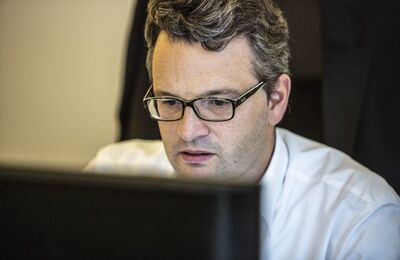
More room in the main office in Zurich.
We have expanded our office in Zurich to Weinbergstrasse 102, situated at the tram station Ottikerstrasse just a few stations from Zurich's main station.
The new address:
Swiss Economics
Weinbergstrasse 102
CH-8006 Zurich

Presentation on postal strategies in a digital age.
Christian Jaag presented a paper on "Postal Strategies in a Digital age" at the 4th Conference on the Regulation of Infrastructures of the Florence School of Regulation.

Multiple papers presented in Athens.
Swiss Economics contributed three presentations and papers to the 23rd Conference on Postal and Delivery Economics:
- Commercial and regulatory challenges for postal e-services in Switzerland
- Cryptocurrencies: New Opportunities for Postal Financial Services
- Postal strategies in a digital age
All papers are available in our Working Paper Series.

A contribution of Swiss Economics team members has been published in the journal for Competition and Regulation in Network Industries.
Abstract: Rail passenger transport services with integrated regular interval timetables (IRIT) offer passengers a regular interval timetable for services on the railway network. IRIT have the potential to increase the quality and attractiveness of railway passenger services in comparison to other transport modes. This paper summarizes the advantages and challenges of the implementation of IRIT for railway passenger services, presents a quantitative model which simulates passenger utility in an IRIT railway system compared to other forms of timetables, and derives the main requirements for the successful introduction of IRIT. The comparison of the regulatory framework, the role of IRIT and the development of passenger railway services in CH, the NL and the UK, shows that in those countries where either IRIT has been introduced (CH) or the high frequency of trains between cities provides for a system comparable to IRIT (NL), railway services play a more important role in the modal split. The successful introduction of IRIT requires a long-run implementation schedule which identifies the necessary investment in the railway infrastructure and points out the financial resources available to make those investments. Further, IRIT requires a high level of punctuality of railway passenger services, coordination between railway companies when designing the timetable and a priority rule for passenger railway services within IRIT when there are capacity restrictions on the railway network.

A study for Bundesamt für Energie (BFE).
The Swiss Federal Office of Energy (SFOE) published a report of Ecofys and Swiss Economics on future energy markets and the role of power network operators.

A collaboration with the University of Zurich.

Article on the experiences with the electricity market opening in the EU.
In a recent article on the experiences with the electricity market in the EU, we conclude that the member states have not yet worked out a silver bullet in the organization of the regulatory conditions.

Two new publications on the postal market in Switzerland and in the United States.

Swiss Economics welcomes Dr. Michael Funk as a new staff member!
Dr. Michael Funk is a project leader for Swiss Economics with a focus on competition policy and regulatory economics. After his studies in history and economics at the University of Fribourg, he obtained his Doctorate in the areas of political economics and financial sciences. He subsequently worked as an economist for the competition commission.

Presentation at the International Postal and e-Communications Conference on the Swiss regulatory framework for the postal sector in light of current challenges.
At the International Postal and e-Communications Conference, Christian Jaag gave a presentation on the Swiss regulatory framework for the postal sector in light of current challenges.

Dr. Martin Lutzenberger appointed Director Berlin Office.
Martin Lutzenberger is our new Director of Office Berlin. Focusing on competition economics, economic policy, transportation and energy, Martin will develop our activities in Germany.
After his studies in economics at the University of Freiburg i.Br. he received a doctoral degree at the University of Zurich. From 2010 to 2014, he was a project manager and lecturer at the University of Lucerne. Besides, he was a lecturer at the University of Zurich and an external expert in Swiss Economics.

Recent conference contributions are available in our working paper series.
Swiss Economics has presented recent research papers at the 22th Conference on Postal and Delivery Economics:
- USO cost allocation rules and welfare
- Market Regulations and USO in the Revised Swiss Postal Act
- Estimating the Financial Impact of Discontinuing Saturday Delivery
The works are available in our Working Paper Series.

We accept payments and offer to pay salaries in Bitcoin.
As of now, we accept Bitcoin as payment for our consulting services. We also offer our employees the option to receive their salary (or a part of it) in Bitcoin.

A report for the United States Postal Regulatory Commission.
The U.S. Postal Regulatory Commission (PRC) published today a report of Swiss Economics on the Impact of the discontinuance of Saturday delivery for letters and flats on the U.S. Postal Service.

Presentation of the research paper on «The Effect of Payment Reversibility on E-commerce and Postal Quality».
Christian Jaag presented the research paper «The Effect of Payment Reversibility on E-commerce and Postal Quality» at the 8th Bi-Annual Postal Economics Conference of the Toulouse School of Economics. The irreversibility of payments in virtual currencies shifts the risk of e-commerce from merchants to consumers. Under certain conditions, this strengthens online retailers in competition with brick-and-mortar stores as well as incentives for postal quality.

A report for Bundesnetzagentur.
BNetzA published the report of Swiss Economics on benchmarking the German energy distribution system operators.

New publications on assessing the burden of universal service providers and on calculating the net costs of home delivery obligations.
Two new publications of Swiss Economics team members have been published in the book «The Role of the Postal and Delivery Sector in a Digital Age».
To the book
To the working paper «USO Burden»
To the working paper «USO Delivery»

Contribution to the webinar on “Virtual currencies: Exploring a Potential Role for Postal Operators».
The webinar included inputs from the USPS IOG Global Team and the UPU

Our latest Swiss Economics update elaborates on the opportunities virtual currencies present to the postal sector.
Virtual currencies like Bitcoin are progressively gaining in popularity. However, limited availability still preempts their broad usage. Postal operators with their spatially comprehensive physical presence could play a key role in providing easy, quick and nationwide access to these alternative currencies. The postal network thus constitutes a natural bridge between the virtual and the physical worlds.

Swiss Economics welcomes Dr. Christian Bach as a new staff member!
Christian Bach is a Project Manager with Swiss Economics and lectures at the EpiCenter, Maastricht University. He is an expert in game theory and works in network industries, regulation and on virtual currencies. After his studies of economics and philosophy, he received a Ph.D. in game theory from HEC Lausanne and Maastricht University. Christian Bach was a postdoctoral fellow at Maastricht University, and a visiting scholar at NYU Stern School of Business.

New publication on price regulation and the financing of Universal Service Obligations.
This article explores the complementary roles of price regulation and universal service regulation in network industries The analysis shows that current practices of costing and financing universal services may result in unintended market distortions. The article quantifies these effects and demonstrates how such distortions can be avoided.

Swiss Economics' update for May 2013.
E-commerce is an important growth area for postal operators. In its update, Swiss Economics analyzes and discusses the risks and opportunities associated with maintaining or even extending the regulation of e-commerce.

Three new publications on consumer preferences, termination charges, and social cost of regulation.
How to better measure consumer preferences in the postal market? How to set international parcel termination charges? What is the social cost of regulation in the postal sector? In the recently published book «Reforming the Postal Sector in the Face of Electronic Competition» by Prof. M. Crew and Prof. P. Kleindorfer, three papers by members of Swiss Economics have been included that address these questions.

Presentation at the 2nd European Postal Regulation Forum on the regulation of e-commerce.

Presentation at the 3rd IEEE Smart Grid World Forum on the regulation of smart grids.
Urs Trinkner was asked by the 3rd IEEE Smart Grid World Forum to address the regulation of smart grids in an introduction and a panel discussion.

A presentation by Sonia Strube Martins.
At the 5th Annual Competition and Regulation in Network Industries Conference in Brussels, Sonia Strube Martins presented a paper on Integrated timetables for railway passenger transport services.

A presentation by Christian Jaag.
At the 3rd Annual Trends in Innovation in the Postal Market Conference, Christian Jaag presented a new research paper on the interplay of universal service obligations and patents in network industries.

Swiss Economics contributed new research papers to the 20th Conference on Postal and Delivery Economics.
Swiss Economics contributed the following new research papers to the 20th Conference on Postal and Delivery Economics:
- Defining and Financing an Intermodal USO
- Competition and the Social Cost of Regulation in the Postal Sector
- Termination Charges in the International Parcel Market
- Measuring Consumer Preferences for Postal Services
All publications are available here.

Swiss Economics welcomes Dr. Sonia Strube Martins as a new staff member!

Swiss Economics' update for February 2012.
The convergence of physical letter mail and electronic substitutes challenges postal operators and the regulatory framework alike. In its update, Swiss Economics analyzes and discusses the economic context.

A presentation by Christian Jaag.
At the Post-Expo 2011, World Postal Business Forum Christian Jaag gave a presentation on «The role of the universal service obligation in postal competition».

The Review of Network Economics published a new article on the financing of universal service obligations.
The paper «What is an Unfair Burden? Compensating the Net Cost of Universal Service Provision» by Christian Jaag appeared in the Review of Network Economics. It discusses the net cost of universal service obligations and the potential burden they represent on the universal service provider. Specifically, it analyzes the situation in the postal sector after full liberalization.
The paper considers various interpretations of what an unfair burden might be and discusses the competitive impact of corresponding compensation scenarios by means of a stylized theoretical model with endogenous entry and coverage decisions.

Two new presentations on defending markets and adapting the USO in a future-oriented way.
«Defending Mail Markets against New Entrants»
To the slides
«Future of USO - Economic rationale for universal services and implications for a future-oriented definition of universal service obligations»
To the slides

Job opening: Swiss Economics is looking for a passionate and exceptional economist.
Swiss Economics is looking for a passionate and exceptional economist with the capability to apply the most recent microeconomic concepts and to find pragmatic and robust solutions to complex problems. You are aiming at earning a doctorate to deepen your knowledge in industrial and regulatory economics and looking for an exciting career start opportunity in economic consultancy.
We are looking forward to receiving your CV and cover letter.

A new publication written by Swiss Economics.
The research article «Impact of VAT-Exemptions in the Postal Sector on Competition and Welfare» by Swiss Economics and researchers from the University of Zurich shows how service providers exempted from the obligation to pay a value-added tax are favoured in competition. Further, this unequal treatment substantially affects outsourcing decisions and the labour market.
Helmut Dietl, Christian Jaag, Markus Lang, Martin Lutzenberger and Urs Trinkner (2011). «Impact of VAT-Exemptions in the Postal Sector on Competition and Welfare». In Reinventing the Postal Sector in an Electronic Age. Edited by M. Crew and P.R. Kleindorfer, Edward Elgar, pp. 267-280.
Published in the same book: Maegli Martin, Christian Jaag, Martin Koller and Urs Trinkner (2011). «Postal Markets and Electronic Substitution: Implications for Regulatory Practices and Institutions in Europe». In Reinventing the Postal Sector in an Electronic Age. Edited by M. Crew and P.R. Kleindorfer, Edward Elgar, pp. 109-122.

An article by Christian Jaag and Urs Trinkner has been published in the Journal of Regulatory Economics.
The research article «The interaction between universal service costing and financing in the postal sector: a calibrated approach» by Christian Jaag and Urs Trinkner has been published in the Journal of Regulatory Economics.

Christian Jaag gave a presentation on «Yet another case of unintended consequences: VAT exemption and the public interest» at the DG MARKT economic seminar.
The presentation illustrates the distortive effects of VAT exemptions on competition in a newly liberalized industry and how they can be included in the calculation of the net cost of universal service obligations.

Swiss Economics presented the paper «An Economic Framework to Understand and Assess Regulations in Network Industries».
Swiss Economics presented the paper «An Economic Framework to Understand and Assess Regulations in Network Industries» at the 2010 Conference on Competition and Regulation in Network Industries.
In addition to a theoretical framework, he also presented two applications: Liberalization in network industries and the development of regulation in the postal sector.

Swiss Economics welcomes Oliver Fürst as a new staff member!
Oliver Fürst holds a Master of Arts in Economics and Business Administration from the University of Zurich. At Swiss Economics he works as a consultant for strategy and regulation in network industries.

Swiss Economics contributed three new research papers to the Conference on Trends and Innovation for the Postal Market.
Post Office Network Realignments and their Impact on Innovation
To the presentation
Postal Regulation, Declining Mail Volumes, and the Transformation of Business Models?
To the presentation
Postal markets and electronic substitution: What is the impact of intermodal competition on regulatory practices and institutions? The paper has received the «best paper award».
To the document

Swiss Economics contributed with three presentations to the 18th Conference on Postal and Delivery Economics.
- Impact of VAT-Exemptions in the Postal Sector on Competition and Welfare
- Postal Markets and Electronic Substitution: What is the Impact of Convergence on Regulatory Practices and Institutions?
- Practical Approaches to USO Costing and Financing

At the «Second Annual Conference on Competition and Regulation in Network Industries» Christian Jaag has given a presentation on «Approaches to FTTH-Regulation: An International Comparison».
Christian Jaag gave a presentation on «Approaches to FTTH-Regulation: An International Comparison» at the 2nd Annual Conference on Competition and Regulation in Network Industries.

A presentation by Urs Trinkner.
At the «IPC Senior Executive Forum on Regulation» Urs Trinkner has given a presentation on «Shaping the USO? An Outline of Thought from an Economic Perspective».

A presentation by Christian Jaag.
At the 42nd Freiburger Verkehrsseminar, Christian Jaag gave a presentation on «Preisobergrenzen in liberalisierten Postmärkten» (in German).

Christian Jaag and Urs Trinkner presented their paper.
Christian Jaag and Urs Trinkner presented their paper «Regulation in Network Industries: Theory and Practice» at the 1st Annual Conference on Competition and Regulation in Network Industries.

A presentation by Christian Jaag.
At the 1st European Postal Benchmarking Workshop on Regulatory and Legal Affairs in Brussels, Christian Jaag has given a presentation on «Calculating the Net Cost of the USO».

We are delighted to welcome Nina Schnyder and Stephan Minger to the team and congratulate Andreas Stritt on his promotion.
Andreas Stritt has been with Swiss Economics since 2022 and has been promoted to Economist. He focuses on energy, transport and competition economics. He earned a Master's degree in economics from the University of Berne, with a focus on data analysis and industrial economics.
Nina Schnyder also joins the team as an Economist. She holds a Master's degree in Environmental Economics from the London School of Economics. After graduating, she worked as an energy and environmental consultant in London and Berlin and will continue to specialize in these areas at Swiss Economics.
Stephan Minger joins Swiss Economics as an Analyst. He holds a Master's degree in Economics from the University of St. Gallen with a focus on financial economics and data analysis. During his studies, he worked as a reasearch assistant in the areas of financial market econometrics, derivatives and monetary policy.
We are confident that their skills and experience will be a valuable addition to our team.

We warmly welcome Winand Emons to our team as a consultant!
We are pleased to welcome Prof. emer. Dr. Winand Emons as a counsel to the Swiss Economics team. He strengthens our team especially in the area of competition economics. Winand Emons has not only distinguished himself in research and teaching at the University of Bern, but has also held important positions as a member of the Competition Commission, Dean and Vice-Dean of the Faculty of Business, Economics and Social Sciences and a member of the Research Commission of the Swiss National Science Foundation (SNSF). His work in his main research focus in the areas of law and economics, microeconomics and competition economics led to numerous publications in renowned journals.
We warmly welcome Winand Emons and wish him success and pleasure in his new activities for Swiss Economics.

Swiss Economics has supported the AZ Regionalfernsehen AG and CH Media in their applications for broadcasting licenses for the years 2025 to 2034.
AZ Regionalfernsehen AG successfully applied with Tele M1 and TeleBärn for the broadcasting licenses in the Aargau/Solothurn and Bern regions. An expert opinion from Swiss Economics was submitted as part of the application. Swiss Economics prepared a second report for CH Media too, that led to a similar success. CH Media has acquired with Radio Central the local radio broadcasting license for the Central-Switzerland region.
Our reports examined in particular the influence of the award of the license on the diversity of offerings and opinions. The focus was on the conflict of objectives between the strict structural independence of broadcasters and their possibility of offering a diverse program. The positive externality of media content for democratic decision-making, which justifies state support for public service, only exists if viewers are truly interested in the broadcasted content. Very small, but structurally independent media providers are usually unable to build up the necessary reach with their limited financial resources, e.g. due to the lack of economies of scale. In addition, there are strong incentives to provide a diverse program, particularly in concentrated media markets.
Swiss Economics concludes in its reports that the synergy benefits and the strengthening of regional media in journalistic competition outweigh any concerns regarding structural independence.
Click here for the project entry on our website.

We welcome Maida Sabotic and Elena Zarkovic to our team and congratulate Seline Spillman and Leah Meyer de Stadelhofen on their promotions.
Seline Spillmann joins our team as Economist. Her focus is on data analysis in various topics as well as labor economics. Among other things, she is active in the fields of competition economics and health. In her master she studied economics at the University of Zurich with a focus on econometrics. During her studies, she worked as a Research Assistant in the area of globalization and labor markets at the University of Zurich.
Elena Zarković joins us as an analyst. She studied economics and business administration in her bachelor's at the University of St. Gallen, where she also earned an additional certificate in Data Science Fundamentals. During her studies, she worked as a research assistant at the Swiss Institute for International Economics and Applied Economic Research at the University of St. Gallen.
Maida Sabotic joins the Swiss Economics team as an Economist. Her areas of expertise include economic policy and data analysis. She holds a Bachelor's degree in Economics, Politics and History from the University of Zurich as well as Master's degree in Economics and Data Science. During her studies she worked at the Institute of Economics at the University of Zurich. After her Master's degree, she completed an internship in economic development cooperation at the State Secretariat for Economic Affairs.
Leah Meyer de Stadelhofen joins our team as an Economist, focusing on behavioral economics, industrial economics and data analysis. Her areas of expertise include regulation, environmental economics, and energy. In addition, Leah joins our Romandie department and is thus involved in the development of Swiss Economics in French-speaking Switzerland and France. She holds a Master in Economics from the University of Lausanne with a specialization in Behavior, Economics, and Evolution. During her studies, she worked as a Teaching Assistant in Microeconomics.
We congratulate all of them and wish them much success and joy in their new activities for Swiss Economics.

We warmly congratulate our staff member, Nicolals Greber, on receiving the ACCL Award for his Master's thesis! The award ceremony took place on 19 September at the Atelier de la Concurrence in Bern.
In his Master's thesis, Nicolas Greber examined the behaviour of self-learning pricing algorithms. Recent studies have shown that certain AI pricing algorithms are able to learn tacit collusion in oligopoly models. Nicolas picked up there with his master's thesis, analysing the behaviour of two more recent AI pricing algorithms. The first algorithm, known as the "deep deterministic policy gradient", failed to achieve constant convergence. In contrast, the second algorithm, the "multi-agent deep deterministic policy gradient", achieved consistent results in a Nash equilibrium. These findings were confirmed by various robustness tests.
We wish Nicolas all the best and success in his PhD at the University of Zürich and in his work for Swiss Economics.

Last weekend we celebrated our 15th anniversary with a visit to the power station, dinner and an overnight stay at the Grimsel Hospiz!
Last weekend we spent an unforgettable time together at the Grimsel Hospiz, surrounded by the breathtaking scenery of the Grimsel region.
Highlights included exciting excursions to the hydroelectric power plant and the impressive Aare Gorge, and a delicious 5-course meal. These experiences deepen our appreciation for 15 years of successful projects.
As passionate economists, we are proud of our continuous growth. This journey would not have been possible without our dedicated team and inspiring projects.
Here's to the next exciting chapters full of success and exciting projects!

In a recent presentation at the Blockchance conference in Hamburg, Matthias Hafner explored the factors that influence the stability of stablecoins and discussed how they relate to recent developments in CBDCs and the tokenization of real-world assets.
Drawing from recent literature, including his own research conducted at the University of Zurich, Matthias Hafner emphasized that the construction and management of collateral are key determinants of stablecoin stability. While externally derived collateral value may compromise the independence of the stablecoin ecosystem, collateral value derived from within the ecosystem carries the risk of death spirals, as observed with TerraUSD. Additionally, centralized management may offer cost-effectiveness but exposes the stablecoin ecosystem to the risk of bank runs, as exemplified by the recent USDC depeg incident.
Further, Matthias Hafner argued that the advent of CBDCs and tokenized real-world assets could potentially put pressure on the demand for stablecoins in the future. This could, for example, result in the need to introduce solutions for stablecoins that offer interest payments based on their underlying collateral.
More detailed information can be found here:
Blockchance presentation slides
Matthias Hafner's research on stablecoins

We are happy to announce that Matthias Hafner has been promoted to Principal. Nicolas Oderbolz has been supporting our team as an Economist since the beginning of this year.
Matthias Hafner supports our team with immediate effect as a Principal and remains the Director of the Center for Cryptoeconomics.
His areas of expertise include financial services, blockchains and cryptoassets.
With his expertise and many years of experience, he will continue to make an indispensable contribution to the further development of these areas. Matthias regularly advises large companies and public authorities and supports start-ups in the implementation of their projects. In addition, he is writing his dissertation and teaches at the University of Zurich on various crypto topics. Before joining Swiss Economics in 2016, he worked at the Competition Commission.
Nicolas Oderbolz has joined Swiss Economics as an Economist with a focus on regulation, health and blockchain. He is involved in various projects in the fields of energy, data analytics and cryptoassets.
Nicolas completed his Bachelor and Master studies in Economics at the University of Zurich, with a focus on empirical methods and data analysis. During his studies, he worked as a research assistant at the University of Zurich in the field of labour and development economics. He has been a valuable part of the Swiss Economics team since the summer of 2022.
We congratulate both of them and wish them much success and joy in their new activities for Swiss Economics.

The article "Blockchain und ihre Anwendungen" by Matthias Hafner and Dr. Christian Jaag was recently published in the quarterly issue of the zsis) Centre for Swiss and International Tax Law.
In their contribution, they explain how blockchain works through illustrative examples and use cases. In addition, they explain the legal classification of crypto-assets and show the limits of the technology.
The publication can be accessed here.

Matthias Hafner presented his research on stablecoins at the Wolfram ChainScience conference in Boston, USA.
The article, "The Four Types of Stablecoins: A Comparative Analysis" (jointly with Marco Henriques Pereira, Prof. Dr. Helmut Dietl, and Juan Beccuti) discusses the conditions under which stablecoins may lose their value. Among others, they explore the crash of Terra and the de- and re-peg of the USDC stablecoin.
Link to the slides: The Four Types of Stablecoins (swiss-economics.ch)

In less than a week, the Shanghai-update is going to be realized on the Ethereum Beacon Chain. This long-anticipated event in the blockchain community motivated us to discuss and compare staking designs of different blockchains in a series of blog post.
In our second blog post of this series, we analyze and compare the staking designs of different blockchains from an economic perspective. To make the information more accessible and compact, we also created a table which can serve as a quick reference.
You can find the whole publication and our new Company Profile on Medium.
Don't hesitate to follow us there to stay updated on our upcoming publications!

Matthias Hafner and Nicolas Greber were awarded first and third place at BBA's 5th Scientific Conference for their research presentations.
Matthias Hafner and Nicolas Greber, two of our blockchain researchers, have made their mark at BBA's 5th Scientific Conference, with first and third place awards for their research presentations.
Matthias explained the recent depeg of the second largest stablecoin USDC and under what conditions stablecoins could lose their value. The paper and slides were created in collaboration with Marco Henriques Pereira, Juan Beccuti and Helmut Dietl.
Nicolas proposed mechanisms for handling liquidity risk using the DeFi lending platform Folks Finance. The paper and slides are the result of joint work with Matthias Hafner, Romain de Luze, Juan Becutti, Benedetto Biondi, Gidon Katten, Michelangelo Riccobene, and Alberto Arrigoni.
More about the British Blockchain Association.

Swiss Economics presents the study "Effectiveness of Corona Measures in Switzerland "
Effectiveness of Corona Measures in Switzerland
Michael Funk presented our study “Effectiveness of Corona Measures in Switzerland” at the 4th Workshop of the Swiss Network on Public Economics (SNoPE). The network aims to strengthen the ties between academics, public administration, the Swiss National Bank and private institutions such as Swiss Economics. This is exactly the intersection we address in almost all of our projects. The study provides important insights into the effectiveness of individual Corona measures in Switzerland. In addition, as the discussion at SNoPE also showed, important lessons can be learned about the opportunities and challenges of empirical evaluation for the public sector. In particular, meeting academic standards and solving non-trivial identification problems while facing time and budget constraints.

In light of the Shanghai update of the Ethereum blockchain, which allows stakers to unstake their ETH, we find it timely to investigate crypto staking in a series of upcoming blog posts.
In our first blog post, we explain the basic terms, economics and mechanisms of staking designs. Later, we compare the staking designs of seven different blockchains.
You can find the whole publication and our new Company Profile on Medium.
Don't hesitate to follow us there to stay updated on our upcoming publications!

Ramon Gmür joins the team as Economist, Romain de Luze promoted to Senior Economist.
Ramon Gmür strengthens our team as an Economist focusing on economic policy, regulatory economics and data analysis. Ramon studied economics, politics and history in his Bachelor's degree at the University of Zurich. He holds a Master’s degree in Economics and Data Science from the University of Zürich, with a special focus on Econometrics and Statistics. During his studies, he worked several years for two chairs at the University of Zurich. Prior to his studies, he worked for a major Swiss bank and earned the business title “Wirtschaftsfachmann KSZH.
Romain de Luze has been promoted to Senior Economist with a focus on regulation, data analytics and risk management. His areas of expertise include energy, financial services and cryptoassets. Additionally, Romain is involved in the development of Swiss Economics in French-speaking Switzerland and France. He holds a Master’s degree in Actuarial Science from the University of Lausanne and a Master’s degree in Economics from the University of Berne. Before Swiss Economics, he worked for several years as a quantitative analyst for a reinsurance company in Zurich.
We congratulate both of them and wish them much success and fun in their new activities for Swiss Economics.

Christian Jaag and Samuel Rutz were awarded "Leading Practitioners" by WWL in the category of Competition Economics.
Every year, Who's Who Legal identifies the world's leading competition economists. This year, Swiss Economics is represented twice - by Christian Jaag and Samuel Rutz - in the illustrious circle of "Leading Practitioners" in Europe (EMEA). We would like to thank our clients for the great trust they place in us.
WWL on Christian Jaag and Samuel Rutz:
Christian Jaag of Swiss Economics receives a lot of recognition for his economic expertise. And is described as an expert who "ensures razor-sharp analyses and can explain highly complex issues simply".
Samuel Rutz is described by peers as an outstanding competition economist in Switzerland who brings his experience as former Chief Economist of the Swiss Competition Commission to bear on the concerns of his clients.


What possibilities are there for using Blockchain Technology to make processes in the creation of value with IP more secure, transparent and efficient? A study for the Swiss Federal Institute of Intellectual Property (IPI).
Intellectual property, for example in the form of patents or copyrights, protects inventors from free riders and thus creates incentives to invest more in research and development and in creative works. IP is also relevant to the rapidly developing field of Blockchain Technology and applications. IPI would like to better assess the current and, more importantly, future demand for IP-services.
As part of this study, we are conducting a survey to which we would like to cordially invite you. The outcome of this survey will be key in shaping the IPI's services related to blockchain and IP. You can participate in the survey until October 31, 2022 over the following link: www.swiss-economics.ch/ip-survey.html.
If you are active in the field of Blockchain and/or IP, we would be delighted to incorporate your opinions, experience and expertise in this study.

We have a new Logo!
Swiss Economics has a new logo. It was designed by Diego Bally and symbolizes our abbreviation "SE". The majority of its components are pointing upwards. The logo represents our development so far and our vision for the next years. Since September, it has decorated our office windows.
The new logo will be rolled out gradually over the next weeks and months. First, we will adapt our web presence, then we will implement it in our documents.
We hope you like it!

Beatrix Marosvölgyi joined our team as an Economist. Her focus lies in environmental and political economics.
Beatrix’s expertise lies in environmental economics, regulatory impact assessments and digital markets. She completed her bachelor's degree in economics at the University of Lucerne and her master's degree at the University of Bern with a focus on environmental economics. Her master's thesis focused on the change in air pollutants due to the aircraft grounding in U.S. airspace after the 9/11 terrorist attacks.
During her studies, Beatrix worked for Swiss Post, the Universities of Lucerne and Bern, and Ernst & Young. She joined Swiss Economics in 2022 as an Analyst.
She is proficient in German and English with mother tongue Hungarian.
We wish Beatrix all the best for her future at Swiss Economics.

The Center for Cryptoeconomics partners with proof-of-stake Blockchain Algorand
Swiss Economics' Center for Cryptoeconomics (cryptecon) joins the Partner Program to intensify its services in the Algorand ecosystem. Algorand is a pure proof-of-stake blockchain focused on the convergence between decentralized and traditional finance. A perfect match for cryptecon with its strong expertise in tokenomics and protocol design for DeFi projects. Previously, cryptecon already advised several Algorand projects such as Folks Finance and Pact. We are now looking forward to intensifying our efforts on Algorand and providing our services as a Preferred Partner.
Algorand creates a green Blockchain with strong focus on efficiency and is exclusive Blockchain Partner of FIFA’s Men’s World Cup 2022 and official Sponsor of FIFA’s Women’s World Cup 2023.

More about Algorand.

We are pleased to announce that Nicolas Greber has joined the team as an Economist. His focus is on competition economics and data-driven analysis including artificial intelligence.
Nicolas Greber holds a bachelor's degree in economics with a focus on industrial economics from the University of Bern. He is currently completing his Master's degree in Economics at the University of St. Gallen with a thesis on the impact of artificial intelligence on competition.

How to design a Swiss Innovation Fund?
The Federal Council wants to strengthen Switzerland as a location for start-ups. On June 22, 2022, it made a decision in favour of a Swiss Innovation Fund. This is intended to improve the financing ecosystem of start-ups during the growth phase (to the press release).
In this context, Swiss Economics was commissioned by SECO to conduct a study on the fundamentals of such an Innovation Fund. The focus was on identifying international best practices and evaluating possible governance options for a Swiss Innovation Fund (Swiss Economics report).

On behalf of the State Secretariat for Economic Affairs (SECO), Swiss Economics has updated its findings on the effectiveness of non-pharmaceutical measures to combat the pandemic.
Swiss Economics has examined the effectiveness of non-pharmaceutical interventions ("NPI") to contain the coronavirus (to the Swiss Economics study) for a second time. This is an update of the meta-analysis on this topic commissioned by the State Secretariat for Economic Affairs (SECO) in June 2020. In addition to the question of the effectiveness of NPI, the study also evaluates the literature on the costs of particular measures and discusses the findings on factors such as the weather and the acceptance of NPI among the population. In the course of combating the pandemic, the question of the optimal level of intervention also arose in Switzerland. Another part of the study is devoted to this question.

Felix Wüthrich and Luca Apreda now Economist, Eva Zuberbühler und Nicolas Eschenbaum now Senior Economist
We are expanding our team:
Felix Wüthrich strengthens our team as an Economist in the areas of environmental economics, behavioural economics and data analysis. During his studies at ETH Zurich, Felix already completed an internship at Swiss Economics and subsequently supported our team as an Analyst.
Luca Apreda, now also Economist, has a focus on regulation and quantitative methods. After completing his Master's degree at the University of Bern, Luca joined Swiss Economics as an Analyst.
Dr. Eva Zuberbühler has been promoted to Senior Economist. Her expertise lies in the areas of regulation, competition, strategy and pricing. Prior to completing her PhD in industrial economics at the University of Bern, Eva worked as a corporate client advisor at a major bank
Dr. Nicolas Eschenbaum has also been promoted to Senior Economist. He focuses on competition economics and digital markets. Nicolas received his PhD in industrial economics from the University of St. Gallen and conducted postdoctoral research on the competitive impact of artificial intelligence, among other topics.
We congratulate all four and wish them much success and joy in their further work for Swiss Economics.

Michael Funk was asked about the consquences of the EU Digital Markets Act (DMA) and Digital Services Act (DSA) by SRF's daily podcast "Newsplus".
The EU is working to improve the current regulatory framework for digital products. The introduction of the Digital Markets Act (DMA) and the Digital Services Act (DSA) is intended to create a uniform set of rules valid throughout the EU.
Michael Funk was asked by SRF about the consequences of the extensive package for Switzerland.
To the podcast (in German): https://www.srf.ch/audio/news-plus/eine-neue-aera-fuer-internet-giganten?id=12166241

We are pleased to welcome Dr. Nicolas Eschenbaum as a new team member of Swiss Economics. He will strengthen our competences in competition economics and regulation.
Nicolas Eschenbaum is an experienced economist focusing on competition economics and economics of digitization.
He holds a Ph.D. in Economics and Finance from the University of St. Gallen with a thesis in industrial organization with a focus on digital markets. Prior to joining Swiss Economics, Nicolas worked as a postdoctoral researcher at the University of St. Gallen, where he continues to conduct research and teach. Currently, his research focuses on the intersection of game theory and artificial intelligence.

We are pleased to announce that Matteo Mattmann has been appointed Managing Economist as of January 1.
We welcome Matteo Mattmann among the shareholders of Swiss Economics. As a member of the Management Board, he will develop our activities in health and behavioural economics. We wish him every success in his new position and look forward to thee continuing collaboration.

Since January 2021, Swiss Economics is a carbon neutral company. Swiss Economics minimizes greenhouse gas emissions and offsets emissions that cannot be avoided.
The exact principles with which we try to contribute to the achievement of Switzerland's climate goals can be found here.
For the year 2021, our employees have decided to offset by means of a reforestation project in Nicaragua. The offset is certified by myclimate.

The modernisation of Swiss merger control is the core element of the partial revision of the Cartel Act (KG). With its 2017 study about the SIEC test, Swiss Economics made an important contribution to the revision.
The partial revision of the KG envisages adapting the Swiss test for merger control to international practice. The fundamental difference between the market dominance test applied in Switzerland so far and the newly envisaged SIEC test lies in the level of the intervention hurdle. Under the SIEC test, mergers can be prohibited or subject to appropriate conditions if they lead to a "significant" impediment to competition. In contrast, under the current standard of review, this is only possible if a merger "completely" eliminates effective competition. In addition, the planned revision also aims to strengthen private damages actions and provides for several procedural changes as well as a clarification with regard to inadmissible agreements.
The consultation period lasts until 11 March 2022. It can be assumed that the new provisions will not enter into force before 2023/24.

Malou and Valpuri had the opportunity to spend the "Future Day" at Swiss Economics.
Highlights of their day in our office were conducting interviews and editing them into a video, behavioural economics experiments with a chocolate reward and eating pizza in the park. The thoughts of the two primary school students of their fathers' work are in the video below.

Ann-Kathrin Crede participated in the SRF programme "Club" on the topic of National Immunisation Week and contributed with her behavioural economics expertise to the question of how to incentivize people to vaccinate themselves.
Quelle: srf.ch

Swiss Economics/cryptecon continue to support the CV Labs Incubation Program for start-ups using the Blockchain technology.
Recently, Juan Beccuti joined CV Labs as a mentor for the start-ups' incubation program. Together with Matthias Hafner (who joined CV Labs in 2019), he shares his expertise in platform and token economics. They present and discuss with the program's participants the main characteristics, considerations, and decisions to consider when designing token-based ecosystems.

Presentation of the interim report in the project to hedge terror and pandemic risks at the Federal Ministry of Finance in Berlin.
Swiss Economics, presented together with Christian Hott (from Economic Advice) the first results in the project on hedging terror and pandemic risks at the Federal Ministry of Finance in Berlin.

Lilia is a quantitative economist strengthening our competencies in analyzing panel and time-series data. Lilia is proficient in English and German with mother tongue Russian.
Dr. Lilia Ruslanova is a quantiative economist focusing on empirical methods, econometrics and DCF modelling. She holds a PhD in Economics from the University of Zurich. During her work as a doctoral student as well as research associate at the University of Zurich, she accumulated years of proficient experience in processing and analyzing data using various quantitative methods and statistical tools. The main fields of her research interests are International Macroeconomics, International Trade, Financial Regulation, Financial and Real Estate Markets.

Juan is a microeconomist and industrial engineer with a focus on market design. He will support Swiss Economics in platform and crypto economics.
Juan is an experienced economist focusing on platform economics, contract theory, and auctions. Amongst others, he will support our team in the analysis of incentives in crypto markets and blockchain protocols. Juan's mother tongue is Spanish, extending our reach into the Hispanic region.
Juan holds a Ph.D. in Economics from Universidad Carlos III de Madrid with a dissertation about mechanism design. He also has a degree in industrial engineering. Prior to joining Swiss Economics full-time, Juan supported Swiss Economics as a Senior Fellow and worked as a Postdoctoral Associate at the University of Bern.

We have moved!
Right next to the tram station Ottikerstrasse we have found freshly renovated and bright office premises with more space.
Our new address:
Swiss Economics
Ottikerstrasse 7
CH-8006 Zurich

We welcome our new team member Dr. Eva Zuberbühler. Eva has a strong background in industrial economics an will strengthen our competences in regulation and competition economics.
Eva Zuberbühler is Economist with a focus on regulation, competition economics, valuation as well as strategy and pricing. Before she received a PhD from the University of Bern she worked for several years in the corporate client's division at a bank.

Our website is now also available in French.
To better serve our French-speaking customers our website is now available in French.
For the time being, some parts of the website such as News and Projects remain in English and/or German.

We welcome our new team member Romain de Luze, focusing on Data Analysis and Financial Services.
Romain de Luze is an Economist with a focus on data analytics, financial services and the energy sector. He studied at HEC Lausanne as well as at the University of Bern. He worked for several years as a quantitative risk analyst at a leading reinsurance company in Zurich.
He holds a Bachelor's degree in Management and a Master's degree in Actuarial Sciences from HEC Lausanne and will soon complete a second Master's degree in Economics at the University of Bern.

Who's Who Legal Switzerland recognized Christian Jaag as Competition Economist of the Year for the third time in a row.
The Who’s Who Legal Awards are awarded each year to leading Swiss firms, specialist lawyers and experts in recognition of their outstanding performance and contribution to their respective industries.
Further information can be found here.

The German Economic Institute awarded Ann-Kathrin Crede for her outstanding PhD thesis in behavioral economics.
Ann-Kathrin Crede is awarded the Max-Weber-Preis. The German Economic Institute awarded her for her PhD thesis "Experimental evidence on behaviour in organizations and markets". The Institute honours young researchers for their contributions to business ethics and ethics of economics. Congratulations, Ann-Kathrin Crede!

Lukas Bruhin ist Fürspecher und verfügt über langjährige Erfahrung in der Regulierung von Netzindustrien sowie in der Steuerung und Führung zentraler und dezentraler Einheiten des Bundes.
Er ist Präsident des Institutsrats von Swissmedic und war zuletzt acht Jahre Generalsekretär des Eidgenössischen Departements des Innern (EDI). Zuvor arbeitete er unter anderem im Eidgenössischen Departement für Umwelt, Verkehr, Energie und Kommunikation (UVEK) als stellvertretender Generalsekretär sowie bei der Schweizerischen Post als Leiter Internationales und Regulierungsfragen und als persönlicher Mitarbeiter des Konzernleiters.
Der Verwaltungsrat von Swiss Economics entscheidet über die strategische und organisatorische Ausrichtung von Swiss Economics.

Swiss Competition Commission (COMCO) cleared the transaction Sunrise | Liberty Global. Swiss Economics accompanied the examination from the outset with economic expertise.
Swiss Economics unterstütze Sunrise in diesem Verfahren in enger Zusammenarbeit mit der Anwaltskanzlei Lenz & Staehelin. Unser Team umfasste Samuel Rutz, Michael Funk, Matthias Hafner und Christian Jaag.
Swiss Economics hatte Sunrise bereits im letztjährigen Fusionskontrollverfahren bezüglich der umgekehrten Transaktion erfolgreich unterstützt. Schon damals hatte die WEKO den Zusammenschluss nach vertiefter Prüfung bedingungslos freigegeben. Anschliessend lehnte jedoch die Mehrheit der Aktionäre/innen die Übernahme ab. Nach erneuter Prüfung kam die WEKO zum Schluss, dass die Marktverhältnisse seither weitgehend unverändert blieben.

Who’s Who Legal 2020 featured Samuel Rutz, Michael Funk and Christian Jaag for their outstanding work in competition economics.
Samuel Rutz is mentioned in the following categories:
- - Competition - Economists
- - Experts - Economics - Competition Economists
WWL says: Samuel Rutz is a well-recognised figure in the Swiss market who is commended for his profound knowledge of competition regulation and policy.
Michael Funk is mentioned in the following categories:
- - Competition Future Leaders - Economists
- - Experts - Economics - Competition Economists - Future Leaders
WWL says: Michael Funk receives widespread commendations for his excellent practice, which sees him provide commercially astute analysis on competition policy issues.
Christian Jaag is mentioned in the following categories:
- - Competition - Economists
- - Experts - Economics - Competition Economists
- - Switzerland - Competition Economists
WWL says: Christian Jaag is "highly recommended" as "one of the very best competition economists in Switzerland". Peers and clients say: "Christian is brilliant at connecting academic and abstract thinking to concrete business needs."

Swiss Economics Principal Tobias Binz discusses this question in an article published in the latest issue of Competition and Regulation in Network Industries.
He uses a microeconomic framework to illustrate how firm and market characteristics determine the extent to which economy-wide demand shocks are translated into profit fluctuations. The findings may help regulators to improve the composition of the peer groups that are used to assess airports' Beta risk.
The published article can be accessed online through Competition and Regulation in Network Industries' website. A working paper version is available here.

The Fair Price Initiative aims to introduce the concept of "relative market power" to Swiss competition law. However, from an economic point of view, the concept is not an appropriate instrument to combat the high prices in Switzerland.
Read more (German)

Swiss Economics was commissioned by the Swiss State Secretariat for Economic Affairs (SECO) to conduct a meta-analysis on the effectiveness of non-pharmaceutical measures to contain the spread of the coronavirus.
On the 27th of April, two months after they were first introduced, the federal government started to relax the measures to contain the spread of the new coronavirus (SARS-CoV-2). It cannot be ruled out that this easing will lead to a renewed increase in infection rates or even a second wave of infections.
The Swiss Economics study provides an overview of available evidence on the effectiveness of various measures and indicates which measures would be particularly appropriate to implement in case infection rates start to increase again.

Swiss Economics supported the Irish Commission for Aviation Regulation in determining capital costs over the 2020-24 regulatory period. The Appeals Panel has decided in favour of the Commission of Aviation Regulation regarding appeals about capital costs.
Swiss Economics supported the Irish Commission for Aviation Regulation (CAR) in determining capital costs (WACC) over the 2020-24 regulatory period. After CAR published its projections, appeals have been made by Dublin Airport and Raynair. Among other points, the appeals targeted capital costs. An independent panel has now rejected most points of these appeals including the capital costs. CAR welcomes the decision of the panel and its argumentation. The panel stated that the numbers rely on the evaluation of the current economic conditions and conform with statutory requirements.
Press Release from the Commission for Aviation Regulation (2 June 2020)

Sunrise claims damages of CHF 350 million from Swisscom for abuse of its dominant position in the ADSL wholesale sector. Swiss Economics has supported Sunrise in quantifying the harm from the infringement.
Extract from the press release:
Swisscom abused its dominant market position from 2001 to 2007, and unlawfully hindered the competition with its pricing policy for ADSL services. The former monopolist practised a margin squeeze which made it impossible for Sunrise as a wholesale customer, to operate its ADSL business profitably.
This was confirmed by the Federal Supreme Court on December 9, 2019 after a ten-year appeal process. Swisscom was sentenced to a fine of CHF 186 million.
On the basis of this ruling, Sunrise is claiming damages of CHF 350 million plus interest from Swisscom.
Sunrise commissioned the renowned consulting company Swiss Economics to calculate the damage to Sunrise. This is due to the loss of market share and prevented gain in the broadband Internet market and adjacent markets (landline and mobile communications). The total amounts to CHF 457 million, a greater number than originally assumed. As a precautionary measure to prevent limitation, Sunrise had interrupted the statute of limitation for a claim of CHF 350 million and is filing a claim for damages of CHF 350 million plus interest with the Bern Commercial Court today.
Our team includes Christian Jaag, Michael Funk and Matthias Hafner.

The Swiss Competition Commission has approved a merger between Swiss railway company SBB Cargo and several road freight firms without imposing any remedies. Swiss Economics provided economic evidence related to efficiencies arising from the merger to inform the Commission's thinking.
The Competition Commission found that the investment of Swiss Combi (a joint venture of Planzer, Camion-Transport, Galliker, and Bertschi) in SBB Cargo does not eliminate competition in any of the concerned markets. The decision will increase the economic viability of the Swiss rail freight business and will lead to innovative new services being made available.
During Phase II of the investigation, Swiss Economics, in collaboration with SBB Cargo and law firm Walder Wyss, produced detailed economic evidence of the investment's effects on competition and welfare. The engagement was led by Samuel Rutz, Michael Funk, and Tobias Binz.

We welcome our new team member Dr. Ann-Kathrin Crede, focusing on Behavioral Economics.
Ann-Kathrin Crede works as an economist with a focus on Behavioral Economics. She graduated with her PhD in Behavioral and Experimental Economics at the University of Bern and gained experience in running laboratory and field experiments and in applying behavioural insights to organizations during her time as a research assistant.
She holds a Master’s degree in Economics from the University of Passau and a Bachelor’s degree in Business & Economics and French from the University of Kassel.

The French Autorité de régulation des transports (ART) has published its opinion on the appropriate level of the Weighted Average Cost of Capital (WACC) for Parisian airports Charles de Gaulle, Orly, and Le Bourget.
The opinion will play a central role in the negotiations between Aéroports de Paris Group and the French government regarding the Economic Regulation Agreement over the 2021-25 period.
For the assessment of Beta risk, the regulator relied on evidence provided by Swiss Economics. Our contribution was twofold. First, we analysed what drives airports’ systematic risk and defined risk categories for airports under ART’s mandate. Second, we identified valid comparator airports and determined the level of their Beta risk, using regression analysis of stock returns. Our reports on drivers of Beta risk and comparator Betas can be downloaded directly from ART’s website:

Team members of Swiss Economics awarded by Who is Who Switzerland 2020.
Christian Jaag and Samuel Rutz are highlighted for their excellent work as Competition Economists:
“At Swiss Economics, Christian Jaag has an exemplary ability ‘to convey and explain highly complex matters’ to peers and clients alike. His knowledge and skillset make him a ‘brilliant economist to work with’ and one of the leading names in Switzerland.”
“Samuel Rutz of Swiss Economics has wide-ranging knowledge and extensive experience of competition regulation and policy matters in Switzerland.”
#whoswholegal #wwl #competition

Who's Who Legal and Client Choice honoured Christian Jaag as the best Competition Economist in Switzerland in 2020.
At the inaugural Who's Who Legal Switzerland Awards ceremony on February 12, 2020, in Zurich Christian Jaag received the Competition Economist of the Year 2020 Award. Each year Who's Who Legal presents awards to individuals that have performed exceptionally well in each of the featured practice areas according to Who's Who Legal's research.
To the WWL Switzerland award winners
In addition, Christian Jaag was recently rewarded with the Lexology Client Choice award also for his work as a Competition Economist.
Established in 2005, Client Choice recognises those individuals around the world that stand apart for the excellent client care they provide and the quality of their service. The criteria for this recognition focus on the ability to add real value to clients’ businesses above and beyond the other players in the market.

The World Economic Forum (WEF) attracted not only politicians, managers and scientists to Davos but also Blockchain experts, start-ups and investors. Swiss Economics was delighted to exchange views with them.
During the World Economic Forum (WEF), the incubation space provider of the largest Swiss Blockchain Venture Capitalist, CV Labs, organized several events in Davos designed to showcase and discuss the Blockchain ecosystem. Since Christian Jaag, Matthias Hafner and Jan Christoph Schlegel are mentoring start-ups from the CV Labs incubation program, we were happy to see them pitch and progress, and to exchange views about current topics in the Blockchain ecosystem. Discussions included successful projects Swiss Economics supported in the past. CV VC proudly stated that there are now over 800 Blockchain companies in Switzerland and Lichtenstein. Swiss Economics is looking forward to new exciting collaborations in the Blockchain industry.

Swiss Economics Principal Michael Funk presents his views on the importance of economic analyses in antitrust proceedings during the “Swiss Network on Public Economics”-Workshop at ETH Zurich
At the first workshop of the "Swiss Network on Public Economics" Michael Funk presented a paper on the importance of economic analyses in antitrust proceedings. The focus was on the most recent development in Switzerland, which has resulted in the marginalisation of the economy. This development contrasts with the development in the European Union, where the negative effects of a violation of antitrust law are generally the focus of the proceedings.
The aim of the newly founded network is to strengthen relations between academics and practitioners at universities, in public administrations, the Swiss National Bank and private institutions.

Swiss Economics supports the second incubation program of the largest investment ecosystem for start-ups using the Blockchain technology in Zug, Switzerland (CV Labs Incubation Program).
Recently, Christian Jaag and Matthias Hafner met the start-ups and presented their expertise and experience in platform and monetary economics for token-based projects. In their workshop they discussed characteristics, considerations and decisions to be made when designing token-based ecosystems.

In a collaboration with Professors Pierre Fleckinger and Constance Monnier, both affiliated with OCA, our competition law disputes partner in France, Tobias Binz and Christian Jaag authored an article on the sensitivity underlying theoretical predictions of the pass-on rate. The article has been published in Concurrences N°4-2019.
The article can be accessed online through the Concurrences website.

Christian Jaag gave the opening keynote at the CV summit Frankfurt which is part of this year’s Euro Finance Week.
Christian Jaag shared his thoughts on “Be your own bank? The role of financial institutions in a decentralized economy”.

The Irish Commission for Aviation Regulation has published its Final Determination on the maximum level of passenger levies that Dublin Airport may charge over the 2020-24 regulatory period.
The new price cap regime ensures that passengers travelling through Dublin Airport will experience high-quality services at a reasonable cost. Swiss Economics advised the Commission on the appropriate allowance for capital costs. In our work, we considered recent developments in financial markets, Dublin Airport’s ambitious investment plans, differences in risk profiles across airports, and many other factors that play a role in determining the regulatory WACC. The Commission has published our report alongside its Final Determination on its website.
To the Swiss Economics report
To the Final Determination of the Commission for Aviation Regulation

At the "Infrastrukturtagung 2019" Christian Jaag presented a literature overview on the effects of climate change on Swiss infrastructures.
Abstract of the report:
"Wie wird sich der Klimawandel auf die Schweizer Infrastruktursektoren auswirken? Im Rahmen eines Literaturüberblicks werden Studien aus dem In- und Ausland ab dem Jahr 2007 ausgewertet. Die zusätzlichen Schäden entstehen durch den schleichenden Klimawandel und Extremereignisse. Neben dem Transport- und dem Energiesektor sind auch die Wasserversorgung, Industrieinfrastrukturen, soziale Infrastrukturen und der Tourismus betroffen. Obwohl der Klimawandel insgesamt mehr Schaden als Nutzen bringt, hat er auch positive Auswirkungen. Zum Beispiel kommt es zu weniger kältebedingten Schäden an Strassen und Schienen und die Ausgaben für Heizenergie sinken. Mit steigenden Temperaturen nimmt auch die relative Attraktivität der Schweiz als Sommer-Tourismusdestination zu. Sämtliche verfügbaren Quantifizierungen der Auswirkungen des Klimawandels sind allerdings noch mit grossen Unsicherheiten behaftet."

Christian Jaag becomes an Advisor to the Centre for Evidence Based Blockchain (CEBB) and Swiss Economics' Centre for Cryptoeconomics joins the CEEB as an institutional member.
CEBB is a neutral, independent and decentralised consortium of leading Blockchain research institutions.
Led by some of the world's most eminent academics, CEBB will devise scientific benchmarks and frameworks to support governments, businesses and policymakers in making evidence-based decisions. As a collective voice on the advancement of Evidence-Based blockchain, the academic "Think Tank" of thought leaders and researchers endeavours to establish internationally agreed standards on education, research and policy-making for blockchain technologies. CEBB will also support organisations in setting up regional and institutional EBB chapters, run by the CEBB Leads. CEBB will also assist with the advancement of high-quality research, call for papers and dissemination of scholarly content within the CEBB network. It will also facilitate joint initiatives, workshops, journal clubs, and other academic activities with CEBB members.

Christian Jaag spoke at the UPU World CEO Forum about Blockchain in the postal sector.
As digitalization takes hold and affects whole swathes of national economies, businesses need to adapt and innovate more rapidly than ever. In this context, blockchain and cryptographic technologies can be part of the answer. Yet, there are several possible elements to innovation in this area. An increasingly popular idea is to have start-ups develop the innovations that postal operators will later apply to their business processes. Christian Jaag had an Interesting discussion with Moses Ma, Derek Osborn and the world's postal CEOs about how they have considered and/or applied blockchain innovations in the international postal sector, including through partnerships with start-ups.

Following an in-depth merger examination, the Swiss Competition Commission (COMCO) cleared the transaction Sunrise | Liberty Global on 23 September 2019 without any remedies. Swiss Economics closely accompanied the examination from the outset with economic expertise.
According to COMCO, the transaction will not lead to the creation or strengthening of a dominant position in any of the markets analysed. Rather, COMCO expects the takeover to stimulate competition. Further details can be found in the COMCO press release.
Swiss Economics collaborated during the whole merger examination closely with Meyerlustenberger Lachenal Ltd. (MLL), who advised and represented Sunrise in this merger control proceeding from the outset. Swiss Economics was – inter alia – responsible for data handling, contributed to the economic analysis in all phases of the merger control proceeding and drafted several reports. Our team included Samuel Rutz, Michael Funk, Matthias Hafner and Tobias Binz. On the part of MLL, the team was led by Mario Strebel and included Fabian Koch, André Berne and Göktug Gürbüz. The close collaboration between Swiss Economics and MLL ensured optimal case management both from a legal and economic perspective.

The redistribution from the rich to the poor is very important, as a new study by the University of Lucerne, in which Melanie Häner was involved, shows. A summary of the study was published in today's Neue Zürcher Zeitung.
In addition to a redistributive effect between generations, the OASI also has a redistributive effect from rich to poor. OASI contributions above a certain income have the character of a "high-wage tax" and the minimum pension acts as a basic income for pensioners. The NZZ article by Christoph Schaltegger, Christian Frey and Melanie Häner quantifies the extent of this redistribution.

Publication of a proposal for an amended Swiss electricity market design. Guarantees of origin play a crucial role.
Author: Urs Trinkner

Samuel Rutz speaks about health tourism in "Schweiz Aktuell", a daily news broadcast of the Swiss Broadcasting Corporation (
The video clip can be accessed through the SRG's website.

Who’s Who Legal 2019 featured Samuel Rutz, Michael Funk and Christian Jaag for their outstanding work in competition economics.
Samuel Rutz is mentioned in the following categories:
- - Competition - Economists
- - Experts - Economics - Competition Economists
WWL says: Samuel Rutz is a well-recognised figure in the Swiss market who is commended for his profound knowledge of competition regulation and policy.
Michael Funk is mentioned in the following categories:
- - Competition Future Leaders - Economists
- - Experts - Economics - Competition Economists - Future Leaders
WWL says: Michael Funk is recognised by peers as an "experienced competition economist" who is able to draw on his "great background" at the Swiss investigation authority.
Christian Jaag is mentioned in the following categories:
- - Competition - Economists
- - Experts - Economics - Competition Economists
- - Switzerland - Competition Economists
WWL says: At Swiss Economics, Christian Jaag is lauded as “one of the very best economists active today” who is “able to convey and explain highly complex matters to a broad range of audiences”. He possesses “in-depth knowledge of the area” and is known for his “great ability to challenge traditional concepts”.

We concluded the celebrations for our 10th anniversary with a trip to the Monte Rosa Hut.
We concluded the celebrations for our 10-year-anniversary with a trip to the Monte Rosa Hut in the Swiss Alps close to Zermatt. Guided by Peter Schoch we enjoyed the beautiful nature between Matterhorn and Monte Rosa.
 |
 |
|
|
Start towards Monte Rosa |
|
"Edelweiss" on the wayside |
 |
 |
|
|
Entrance of the Gorner Glacier |
|
Monte Rosa Hut during dinner |
 |
 |
|
| On the panoramic tour back to Zermatt |
|
Crevasse in the upper part of the Gorner Glacier |

Swiss Economics' center for cryptoeconomics is awarded with the Fintech Award "Best Economic Research & Consulting Services 2019 - Europe" hosted by Wealth & Finance International.
To the Award
More on the Center for Cryptoeconomics (cryptecon)

Swiss Economics is happy to announce the new collaboration with CV VC, a Swiss venture capital company for start-ups using Blockchain technology.
Swiss Economics' collaborates with CV VC, the largest investment ecosystem for start-ups using Blockchain technology in Zug, Switzerland. Swiss Economic's platform for blockchain and cryptocurrencies (cryptecon) mentors the participants of the CV Labs Incubation Program. The first edition of the program is now ongoing. Out of 500 applications from 35 countries, 12 startups were selected to participate in the program.
Christian Jaag and Matthias Hafner met the start-ups and presented their expertise and experience in platform and monetary economics for token-based projects. They presented the most important characteristics, considerations and decisions to be made when designing token-based ecosystems.

Urs Trinkner presented his views on how to improve the institutional design of the Swiss rail market at the Lucerne symposium "20 years of railways reform".
To the presentation
To the program

Michael Funk gave two speeches at the 27th Conference for Postal and Delivery Economics in rainy Dublin.
Michael Funk presented his interpretation of the seminal Post Denmark II decision as well as a paper by his colleagues Andreas Haller, Christian Jaag, and Urs Trinkner on the funding of the USO and net cost balancing. As always, this yearly conference of academics and practitioners provided a tremendous opportunity for learning and connecting.

Publication of Samuel Rutz and Urs Trinkner on the economics of water and whether Swiss water utilities should be privatised or not.
Wasser ist aus ökonomischer Sicht kein öffentliches Gut. Gleichwohl kann die leitungsgebundene Wasserversorgung nicht unbesehen den Marktkräften überlassen werden, da insbesondere beim Verteilnetz ein «monopolistischer Engpass» besteht. Die Ausgangslage präsentiert sich ähnlich wie bei Strom-, Gas- und Schienennetzen: Entweder erbringt die öffentliche Hand die gewünschte Versorgung selbst, oder sie übergibt diese an öffentliche oder private Leistungserbringer. Im zweiten Fall gewährleistet er die Qualität der Wasserversorgung durch Regulierung. Aus ökonomischer Sicht sind beide Wege gangbar. Für Schweizer Gemeinden, die über eine gute direktdemokratische Kontrolle verfügen, kann die öffentliche Eigenerbringung vorteilhaft sein.
Autoren: Samuel Rutz, Urs Trinkner

The Irish Commission for Aviation Regulation has published its draft decision on the maximum level of Airport Charges at Dublin Airport over the 2020-24 regulatory period. For the allowed rate of return on capital, the authority has relied on a report prepared by Swiss Economics.
Our report reflects that financial markets are currently undergoing exceptional times. Real government bond yields have fallen to a historically low level in the past couple of years, suggesting that the real expected return from risk-free assets is currently negative. Traditional approaches to estimating the cost of capital may fail to adequately capture the peculiarities of this new market environment. Hence, we assessed whether the ECB’s recent halt of quantitative easing is likely to have a significant effect on the market and analysed whether financial markets expect bond yields to rise again in the near future. Also, we considered evidence that expectations on equity returns may be more stable over time than underlying risk premia, indicating a so-called Total Market Return approach may be preferred over the traditional Equity Risk Premium approach to estimate the cost of equity.
The full report can be downloaded from the Commission for Aviation Regulation’s website.

Does digitalization require new rules for the international taxation of companies? OECD and the European Union try to change international tax law in favour of countries where consumption takes place.
In der aktuellen Ausgabe der Zeitschrift für Europarecht hat Christian Jaag zusammen mit Luzius Cavelti einen Leitartikel zum Thema «Die Bedeutung der Digitalisierung für das internationale Unternehmenssteuerrecht» publiziert.

At the inaugural Who's Who Legal Switzerland Awards ceremony on April 3, 2019, in Zurich, Christian Jaag received the Competition Economists Switzerland Expert of the Year 2019 Award. Each year Who's Who Legal presents awards to individuals that have performed exceptionally well in each of the featured practice areas according to Who's Who Legal's research.
Who's Who Legal finds that "at Swiss Economics, Christian Jaag is definitely a brilliant economist to work with according to sources. They note he is the strongest competition economist in Switzerland and enjoys a very good reputation for his work in the field."
To the article.

Michael Funk recently gave his interpretation of the influential Post Denmark II decision to an audience at the Annual Conference of the Leibniz ScienceCampus 2019 Mannheim Centre for Competition and Innovation (MaCCI).
At the Annual Conference of Mannheim Centre for Competition and Innovation, Michael Funk presented a Swiss Economics research paper on competition economics. He argues that a notional as-efficient competitor, often used in the economic assessment of abuse of dominance cases, can be too efficient to be of relevance in practice. In particular, joint costs, which are required to comply with a Universal Service Obligation, should not be considered sunk when determining the cost structure for other services or else there is a risk of imposing unrealistic efficiency standards on competitors.

Bundesnetzagentur published the latest benchmarking report by Swiss Economics. In the report, methodical details are carried out and the results are documented.
Swiss Economics, together with SUMICSID and IAEW carried out an efficiency comparison of electricity distribution system operators in the third regulatory period. Analyzed in detail was, among others, the illustration of decentralized generation. The published draft contains all important methodical aspects and documents the results. For the benchmarking, around 200 system operators were compared based on their cost efficiency. The final version will follow after the system operators have had the opportunity to comment on the draft.

Swiss Economics and COMCO present a case at the Annual conference of the Association of Competition Economists (ACE)
Screening tools can mitigate the dependency on whistleblowers and leniency applicants and enable the authorities to fight against bid rigging cartels proactively. The Investigation "See Gaster" in Switzerland was triggered by an ex-ante screening method developed by the Swiss Competition Commission. In the session, Yavuz Karagök (ComCo), Frode Steen (Norwegian School of Economics) and Michael Funk (Swiss Economics) discuss the strengths and weaknesses of screening methods with a concrete example.

Swiss Economics analyses the impact of the sharing economy on public transport.
Swiss Economics has investigated the impact of the sharing economy on public transport together with the University of Lucerne. Based on our discrete choice experiments we conclude that regulations are critical for the expected modal split.

Samuel Rutz's article «Screening for «Bid Rigging Does it Work?» was recently published in the Journal of Competition Law & Economics.
The article discusses a screening method to detect bid rigging cartels. Based on the findings of the authors, the Swiss Competition Commission (COMCO) opened an investigation and sanctioned several firms for bid rigging.

Christian Jaag was named «leading expert» in the categories Legal Competition and Consulting Experts. Samuel Rutz was honoured as a «future leader» in the categories of Competition and Consulting Experts.
Dr. Christian Jaag and Dr. Samuel Rutz have recently been featured in Who's Who Legal 2018.
Christian is listed in Who's Who Legal: Competition as a leading economist. WWL says: «Christian Jaag is a superb competition economist who is regularly called on to advise both public and private-sector clients on strategy, regulation and policy.»In addition, he is listed in Who's Who Legal: Switzerland. WWL writes: «Christian Jaag is widely recognised as «a leading competition economist» and impresses peers with his «highly creative, precise and hands-on approach», as well as his «impressive theoretical and practical skills». Lastly, Christian is listed in Who's Who: Consulting Experts.
To Christian's biography on WWL
Samuel is listed as a future leader in Who's Who Legal: Competition and Who's Who Legal: Consulting Experts.

The article «The more economic approach to predatory pricing» was recently published in the Journal of Competition Law & Economics.
Abstract: The «more economic approach» was introduced to antitrust to achieve a more effect-based and theoretically grounded enforcement. However, related to predatory pricing it resulted in systematic over- and under-enforcement: Economic theory does not require dominance for predation to be a rational (and harmful) strategy, although an ex-ante dominant firm would often refrain from predation. Hence, within the current legal framework which requires dominance for antitrust to apply, a more effect-based and theoretically grounded antitrust enforcement cannot pursue harmful predation. Therefore, we suggest separating predatory pricing from the exclusionary abuse of a dominant firm, both legally and analytically. Instead, predatory pricing should be analyzed along the same logic as a merger. In particular, we argue that three elements from merger control should be adopted: in the absence of dominance, market share and/or turnover thresholds may serve as a de minimis rule; recoupment should be analyzed similarly to the competitive effect of a merger between the predator and its prey, and a stronger efficiency defence should be established.

The partnership with OCA strengthens Swiss Economics' competencies in the areas of calculation of damages. OCA will also allow us to more effectively support clients in multinational and multilingual disputes.
Swiss Economics is delighted to announce the recently established partnership with French audit and consulting firm OCA. This new collaboration strengthens our capacity to offer multi-jurisdictional and multilingual dispute resolution services.
OCA has successfully assisted its clients during commercial and financial arbitration and litigation across various countries. The firm's technical capabilities in the area of Corporate Finance and Valuation perfectly complement Swiss Economics' skills in Competition Economics and Industrial Organisation. In collaboration with OCA, we are able to offer our clients both, top-down empirical and conceptual economic evidence as well as detailed bottom-up asset valuation, leading to even more robust results.
In addition, the partnership will allow us to ramp up large-scale case teams proficient in German, French, and English and be able to provide our clients with rigorous analysis under tight time constraints.
For more information, please contact Swiss Economics Managing Partner Christian Jaag or OCA Chairman Mikaël Ouaniche.

We welcome two new team members.
Melanie Häner is a Consultant working on economic policy and competition projects

A lecture by Christian Jaag.

A lecture by Christian Jaag.

A presentation by Christian Jaag.
Christian Jaag gave a presentation on «Introducing Competition in the Passenger Railway Sector - Open Access and Competitive PSO Tendering» at a seminar of the Florence School of Regulation.

An analysis by Swiss Economics.
Swiss Economics has analyzed the unbundling need of Swiss gas network operators in a study that has been published by the Swiss Federal Office of Energy today.

A report for the Office of Inspector General of the United States Postal Service.
Swiss Economics has supported the Office of Inspector General of the United States Postal Service in a study that explores the possibilities of Blockchain technology for the USPS and other postal operators.

Presented at the 24th Conference on Postal and Delivery Economics.
At the 24th Conference on Postal and Delivery Economics Christian Jaag gave a presentation on «The interdependencies between various types of mail items». The presented study finds that there are strong interdependencies between various types of mail. There is an opportunity for postal operators to actively manage their mailstream in order to maintain or increase the attractiveness of their communication channel.

A presentation by Christian Jaag.
Christian Jaag presented the paper «The mailstream as a platform» at the 9th bi-annual Postal Economics Conference on E-commerce, Digital Economy and Delivery Services.

Presented at the Mannheim Competition Policy Forum.
Christian Jaag presented a paper on «The more economic approach to predatory pricing» at the Mannheim Competition Policy Forum.

A presentation by Christian Jaag.
Christian Jaag gave a presentation on «Platforms and anti-competitive clauses» at the ENTraNCE for Executives Workshop on Antitrust Enforcement in Traditional v Online Platforms.

We welcome our two new Counsels Samuel Rutz und Olivier Buchs!
We extend a warm welcome to our two new Counsels Samuel Rutz and Olivier Buchs!
The focus of Samuel Rutz will be on competition economics; Olivier Buchs will be active in our telecommunications team.

A study for the Swiss electricity distribution system operators (DSV).
Swiss Economics has analyzed on behalf of the association of Swiss electricity distribution system operators (DSV) the effects of the EU electricity market opening and its implications for Switzerland. We opt for a sequential approach of first deciding the cornerstones of the Swiss energy strategy before opening the market further.

More room in the main office in Zurich.
We have expanded our office in Zurich to Weinbergstrasse 102, situated at the tram station Ottikerstrasse just a few stations from Zurich's main station.
The new address:
Swiss Economics
Weinbergstrasse 102
CH-8006 Zurich

Presentation on postal strategies in a digital age.
Christian Jaag presented a paper on "Postal Strategies in a Digital age" at the 4th Conference on the Regulation of Infrastructures of the Florence School of Regulation.

Multiple papers presented in Athens.
Swiss Economics contributed three presentations and papers to the 23rd Conference on Postal and Delivery Economics:
- Commercial and regulatory challenges for postal e-services in Switzerland
- Cryptocurrencies: New Opportunities for Postal Financial Services
- Postal strategies in a digital age
All papers are available in our Working Paper Series.

A contribution of Swiss Economics team members has been published in the journal for Competition and Regulation in Network Industries.
Abstract: Rail passenger transport services with integrated regular interval timetables (IRIT) offer passengers a regular interval timetable for services on the railway network. IRIT have the potential to increase the quality and attractiveness of railway passenger services in comparison to other transport modes. This paper summarizes the advantages and challenges of the implementation of IRIT for railway passenger services, presents a quantitative model which simulates passenger utility in an IRIT railway system compared to other forms of timetables, and derives the main requirements for the successful introduction of IRIT. The comparison of the regulatory framework, the role of IRIT and the development of passenger railway services in CH, the NL and the UK, shows that in those countries where either IRIT has been introduced (CH) or the high frequency of trains between cities provides for a system comparable to IRIT (NL), railway services play a more important role in the modal split. The successful introduction of IRIT requires a long-run implementation schedule which identifies the necessary investment in the railway infrastructure and points out the financial resources available to make those investments. Further, IRIT requires a high level of punctuality of railway passenger services, coordination between railway companies when designing the timetable and a priority rule for passenger railway services within IRIT when there are capacity restrictions on the railway network.

A study for Bundesamt für Energie (BFE).
The Swiss Federal Office of Energy (SFOE) published a report of Ecofys and Swiss Economics on future energy markets and the role of power network operators.

A collaboration with the University of Zurich.

Article on the experiences with the electricity market opening in the EU.
In a recent article on the experiences with the electricity market in the EU, we conclude that the member states have not yet worked out a silver bullet in the organization of the regulatory conditions.

Two new publications on the postal market in Switzerland and in the United States.

Swiss Economics welcomes Dr. Michael Funk as a new staff member!
Dr. Michael Funk is a project leader for Swiss Economics with a focus on competition policy and regulatory economics. After his studies in history and economics at the University of Fribourg, he obtained his Doctorate in the areas of political economics and financial sciences. He subsequently worked as an economist for the competition commission.

Presentation at the International Postal and e-Communications Conference on the Swiss regulatory framework for the postal sector in light of current challenges.
At the International Postal and e-Communications Conference, Christian Jaag gave a presentation on the Swiss regulatory framework for the postal sector in light of current challenges.

Dr. Martin Lutzenberger appointed Director Berlin Office.
Martin Lutzenberger is our new Director of Office Berlin. Focusing on competition economics, economic policy, transportation and energy, Martin will develop our activities in Germany.
After his studies in economics at the University of Freiburg i.Br. he received a doctoral degree at the University of Zurich. From 2010 to 2014, he was a project manager and lecturer at the University of Lucerne. Besides, he was a lecturer at the University of Zurich and an external expert in Swiss Economics.

Recent conference contributions are available in our working paper series.
Swiss Economics has presented recent research papers at the 22th Conference on Postal and Delivery Economics:
- USO cost allocation rules and welfare
- Market Regulations and USO in the Revised Swiss Postal Act
- Estimating the Financial Impact of Discontinuing Saturday Delivery
The works are available in our Working Paper Series.

We accept payments and offer to pay salaries in Bitcoin.
As of now, we accept Bitcoin as payment for our consulting services. We also offer our employees the option to receive their salary (or a part of it) in Bitcoin.

A report for the United States Postal Regulatory Commission.
The U.S. Postal Regulatory Commission (PRC) published today a report of Swiss Economics on the Impact of the discontinuance of Saturday delivery for letters and flats on the U.S. Postal Service.

Presentation of the research paper on «The Effect of Payment Reversibility on E-commerce and Postal Quality».
Christian Jaag presented the research paper «The Effect of Payment Reversibility on E-commerce and Postal Quality» at the 8th Bi-Annual Postal Economics Conference of the Toulouse School of Economics. The irreversibility of payments in virtual currencies shifts the risk of e-commerce from merchants to consumers. Under certain conditions, this strengthens online retailers in competition with brick-and-mortar stores as well as incentives for postal quality.

A report for Bundesnetzagentur.
BNetzA published the report of Swiss Economics on benchmarking the German energy distribution system operators.

New publications on assessing the burden of universal service providers and on calculating the net costs of home delivery obligations.
Two new publications of Swiss Economics team members have been published in the book «The Role of the Postal and Delivery Sector in a Digital Age».
To the book
To the working paper «USO Burden»
To the working paper «USO Delivery»

Contribution to the webinar on “Virtual currencies: Exploring a Potential Role for Postal Operators».
The webinar included inputs from the USPS IOG Global Team and the UPU

Our latest Swiss Economics update elaborates on the opportunities virtual currencies present to the postal sector.
Virtual currencies like Bitcoin are progressively gaining in popularity. However, limited availability still preempts their broad usage. Postal operators with their spatially comprehensive physical presence could play a key role in providing easy, quick and nationwide access to these alternative currencies. The postal network thus constitutes a natural bridge between the virtual and the physical worlds.

Swiss Economics welcomes Dr. Christian Bach as a new staff member!
Christian Bach is a Project Manager with Swiss Economics and lectures at the EpiCenter, Maastricht University. He is an expert in game theory and works in network industries, regulation and on virtual currencies. After his studies of economics and philosophy, he received a Ph.D. in game theory from HEC Lausanne and Maastricht University. Christian Bach was a postdoctoral fellow at Maastricht University, and a visiting scholar at NYU Stern School of Business.

New publication on price regulation and the financing of Universal Service Obligations.
This article explores the complementary roles of price regulation and universal service regulation in network industries The analysis shows that current practices of costing and financing universal services may result in unintended market distortions. The article quantifies these effects and demonstrates how such distortions can be avoided.

Swiss Economics' update for May 2013.
E-commerce is an important growth area for postal operators. In its update, Swiss Economics analyzes and discusses the risks and opportunities associated with maintaining or even extending the regulation of e-commerce.

Three new publications on consumer preferences, termination charges, and social cost of regulation.
How to better measure consumer preferences in the postal market? How to set international parcel termination charges? What is the social cost of regulation in the postal sector? In the recently published book «Reforming the Postal Sector in the Face of Electronic Competition» by Prof. M. Crew and Prof. P. Kleindorfer, three papers by members of Swiss Economics have been included that address these questions.

Presentation at the 2nd European Postal Regulation Forum on the regulation of e-commerce.

Presentation at the 3rd IEEE Smart Grid World Forum on the regulation of smart grids.
Urs Trinkner was asked by the 3rd IEEE Smart Grid World Forum to address the regulation of smart grids in an introduction and a panel discussion.

A presentation by Sonia Strube Martins.
At the 5th Annual Competition and Regulation in Network Industries Conference in Brussels, Sonia Strube Martins presented a paper on Integrated timetables for railway passenger transport services.

A presentation by Christian Jaag.
At the 3rd Annual Trends in Innovation in the Postal Market Conference, Christian Jaag presented a new research paper on the interplay of universal service obligations and patents in network industries.

Swiss Economics contributed new research papers to the 20th Conference on Postal and Delivery Economics.
Swiss Economics contributed the following new research papers to the 20th Conference on Postal and Delivery Economics:
- Defining and Financing an Intermodal USO
- Competition and the Social Cost of Regulation in the Postal Sector
- Termination Charges in the International Parcel Market
- Measuring Consumer Preferences for Postal Services
All publications are available here.

Swiss Economics welcomes Dr. Sonia Strube Martins as a new staff member!

Swiss Economics' update for February 2012.
The convergence of physical letter mail and electronic substitutes challenges postal operators and the regulatory framework alike. In its update, Swiss Economics analyzes and discusses the economic context.

A presentation by Christian Jaag.
At the Post-Expo 2011, World Postal Business Forum Christian Jaag gave a presentation on «The role of the universal service obligation in postal competition».

The Review of Network Economics published a new article on the financing of universal service obligations.
The paper «What is an Unfair Burden? Compensating the Net Cost of Universal Service Provision» by Christian Jaag appeared in the Review of Network Economics. It discusses the net cost of universal service obligations and the potential burden they represent on the universal service provider. Specifically, it analyzes the situation in the postal sector after full liberalization.
The paper considers various interpretations of what an unfair burden might be and discusses the competitive impact of corresponding compensation scenarios by means of a stylized theoretical model with endogenous entry and coverage decisions.

Two new presentations on defending markets and adapting the USO in a future-oriented way.
«Defending Mail Markets against New Entrants»
To the slides
«Future of USO - Economic rationale for universal services and implications for a future-oriented definition of universal service obligations»
To the slides

Job opening: Swiss Economics is looking for a passionate and exceptional economist.
Swiss Economics is looking for a passionate and exceptional economist with the capability to apply the most recent microeconomic concepts and to find pragmatic and robust solutions to complex problems. You are aiming at earning a doctorate to deepen your knowledge in industrial and regulatory economics and looking for an exciting career start opportunity in economic consultancy.
We are looking forward to receiving your CV and cover letter.

A new publication written by Swiss Economics.
The research article «Impact of VAT-Exemptions in the Postal Sector on Competition and Welfare» by Swiss Economics and researchers from the University of Zurich shows how service providers exempted from the obligation to pay a value-added tax are favoured in competition. Further, this unequal treatment substantially affects outsourcing decisions and the labour market.
Helmut Dietl, Christian Jaag, Markus Lang, Martin Lutzenberger and Urs Trinkner (2011). «Impact of VAT-Exemptions in the Postal Sector on Competition and Welfare». In Reinventing the Postal Sector in an Electronic Age. Edited by M. Crew and P.R. Kleindorfer, Edward Elgar, pp. 267-280.
Published in the same book: Maegli Martin, Christian Jaag, Martin Koller and Urs Trinkner (2011). «Postal Markets and Electronic Substitution: Implications for Regulatory Practices and Institutions in Europe». In Reinventing the Postal Sector in an Electronic Age. Edited by M. Crew and P.R. Kleindorfer, Edward Elgar, pp. 109-122.

An article by Christian Jaag and Urs Trinkner has been published in the Journal of Regulatory Economics.
The research article «The interaction between universal service costing and financing in the postal sector: a calibrated approach» by Christian Jaag and Urs Trinkner has been published in the Journal of Regulatory Economics.

Christian Jaag gave a presentation on «Yet another case of unintended consequences: VAT exemption and the public interest» at the DG MARKT economic seminar.
The presentation illustrates the distortive effects of VAT exemptions on competition in a newly liberalized industry and how they can be included in the calculation of the net cost of universal service obligations.

Swiss Economics presented the paper «An Economic Framework to Understand and Assess Regulations in Network Industries».
Swiss Economics presented the paper «An Economic Framework to Understand and Assess Regulations in Network Industries» at the 2010 Conference on Competition and Regulation in Network Industries.
In addition to a theoretical framework, he also presented two applications: Liberalization in network industries and the development of regulation in the postal sector.

Swiss Economics welcomes Oliver Fürst as a new staff member!
Oliver Fürst holds a Master of Arts in Economics and Business Administration from the University of Zurich. At Swiss Economics he works as a consultant for strategy and regulation in network industries.

Swiss Economics contributed three new research papers to the Conference on Trends and Innovation for the Postal Market.
Post Office Network Realignments and their Impact on Innovation
To the presentation
Postal Regulation, Declining Mail Volumes, and the Transformation of Business Models?
To the presentation
Postal markets and electronic substitution: What is the impact of intermodal competition on regulatory practices and institutions? The paper has received the «best paper award».
To the document

Swiss Economics contributed with three presentations to the 18th Conference on Postal and Delivery Economics.
- Impact of VAT-Exemptions in the Postal Sector on Competition and Welfare
- Postal Markets and Electronic Substitution: What is the Impact of Convergence on Regulatory Practices and Institutions?
- Practical Approaches to USO Costing and Financing

At the «Second Annual Conference on Competition and Regulation in Network Industries» Christian Jaag has given a presentation on «Approaches to FTTH-Regulation: An International Comparison».
Christian Jaag gave a presentation on «Approaches to FTTH-Regulation: An International Comparison» at the 2nd Annual Conference on Competition and Regulation in Network Industries.

A presentation by Urs Trinkner.
At the «IPC Senior Executive Forum on Regulation» Urs Trinkner has given a presentation on «Shaping the USO? An Outline of Thought from an Economic Perspective».

A presentation by Christian Jaag.
At the 42nd Freiburger Verkehrsseminar, Christian Jaag gave a presentation on «Preisobergrenzen in liberalisierten Postmärkten» (in German).

Christian Jaag and Urs Trinkner presented their paper.
Christian Jaag and Urs Trinkner presented their paper «Regulation in Network Industries: Theory and Practice» at the 1st Annual Conference on Competition and Regulation in Network Industries.

A presentation by Christian Jaag.
At the 1st European Postal Benchmarking Workshop on Regulatory and Legal Affairs in Brussels, Christian Jaag has given a presentation on «Calculating the Net Cost of the USO».
